Похожие презентации:
Additional material for the 5th forms - 1 четверть
1.
ADDITIONAL MATERIALFOR THE 5TH FORMS
1 четверть
2.
Hello!Nice to see you again!
3.
SCHOOL and HOLIDAYS4.
SCHOOL and HOLIDAYS5.
SCHOOL and HOLIDAYS6.
The construction with a model verb“CAN”- мочь, уметь –
(выражает способность что – то делать)
Утвердительное предложение.
I can see a desk in our classroom.
– Я могу видеть парту
в нашей классной комнате.
7.
The construction with a model verb“CAN”- мочь, уметь
Утвердительное предложение.
He/she can see a desk
in our classroom.
– Он/она может видеть парту
в нашей классной комнате.
8.
The construction with a model verb“CAN”- мочь, уметь
Вопросительное предложение.
Can you see a desk
in our classroom?
– Ты можешь видеть парту
в нашей классной комнате?
Yes, I can./No, I can’t.
9.
The construction with a model verb“CAN”- мочь, уметь
Вопросительное предложение.
Can he/she see a desk
in our classroom?
– Он/она может видеть парту
в нашей классной комнате?
Yes, he/she can./ No, he/she can’t.
10.
The construction with a model verb“CAN”- мочь, уметь
(выражает вежливую форму обращения)
Вопросительное предложение.
Can I go out, please?
– Можно я выйду?
Yes, you can./No, you can’t.
11.
The construction with a model verb“CAN”- мочь, уметь
(выражает вежливую форму обращения)
Вопросительное предложение.
Can he/she go out, please?
– Можно ему/ей выйти?
Yes, he/she can./No, he/she can’t.
12.
The construction with a model verb“CAN”- мочь, уметь
(выражает отсутствие способности что – то делать)
Отрицательное предложение.
I can’t play football.
– Я не умею играть
в футбол.
13.
The construction with a model verb“CAN”- мочь, уметь
(выражает отсутствие способности что – то делать)
Отрицательное предложение.
He/she can’t play football.
– Он/она не умеет играть
в футбол.
14.
The construction with a model verb“CAN”- мочь, уметь
(выражает отсутствие способности что – то делать)
Отрицательное предложение.
You/we/they can’t play football.
Ты=вы/мы/они не умеют играть
в футбол.
15.
Закончите предложения, используя таблицу70 page 26
Образец:I like to spend my holidays
1.in the country. I can … .
2.at the seaside. I can … .
3.at camp. I can … .
4.at the farm. I can … .
5.in the city. I can … .
6.in the village. I can … .
7.at the dacha. I can … .
16.
The construction with a model verb“could”- мог, могла, могли –
(Выражает вежливую просьбу сделать что – то)
Could you open the door, please?
Не могли бы вы открыть дверь,
пожалуйста?
17.
The construction with a model verb“may”– можно …
(Выражает разрешение или просьбу)
May I come in? –
Могу я войти?
Утвердительные:
Yes, you may.
Ответы
Отрицательные:
No, you may not.
18.
Местоименияmany -много, многие,
a few - несколько few-мало,
употребляются с исчисляемыми
существительными во множественном числе.
Местоимения
much - много,
a little - немного little - мало,
употребляются с неисчисляемыми
существительными.
19.
Местоимениеmany -много
20.
Местоимениеa few - несколько
21.
Местоимениеfew - мало
22.
Местоимениеmuch - много
23.
МестоимениеA little - немного
24.
Местоимениеlittle - мало
25.
Make up the phrases using the pronouns:many, a few, few//
much, a little, little
Chairs, books, pencils, students, time,
money, water, snow, attention, homework,
museums, words, letters, subjects, trees,
photos, hotels, flowers, berries, butter,
milk, bread, salt, clubs, schools, pictures,
marks, libraries, artists, teachers,
traditions, vegetables, languages,
days, friends, concerts, towns.
26.
Множественное число существительных1)Множественное число
большинства существительных
образуется путем прибавления
к основе окончания
>s:
a map > maps; a bike > bikes;
a pen > pens; an eye > eyes.
27.
Множественное число существительныхa desk
desks
28.
Множественное число существительных2) Множественное число существительных,
основа которых оканчивается
на -s, -ss, -z, -tch, -ch -sh, -х,
образуется путем прибавления
к основе окончания -es
[iz]:
a bus > buses; a dress > dresses;
a jazz > jazzes; a bench > benches;
a match > matches;
a bush > bushes; a box > boxes.
29.
Множественное число существительныхa fox
foxes
30.
Множественное число существительных7) Ряд существительных образует
множественное число
не по правилам(!!!):
a man > men; a woman > women;
a foot > feet; a tooth > teeth;
a mouse > mice;
a child > children.
a businessman > businessmen;
a grandchild > grandchildren.
31.
Множественное число существительныхa child
children
32.
Множественное число существительныхa goose
geese
33.
Множественное число существительных3) Существительные,
оканчивающиеся на -у, перед
которой стоит согласная буква,
во множественном числе
меняют окончание -у на -ies:
an army > armies; a city > cities;
a fly > flies; a factory> factories;
a lady > ladies.
34.
Множественное число существительныхa lady
a ladies
35.
Множественное число существительныхCуществительные,
оканчивающиеся на -у, перед
которой стоит гласная буква,
образуют множественное число
путем прибавления окончания - S :
a boy > boys; a day > days;
a key > keys;
36.
Множественное число существительныхa boy
boys
37.
Множественное число существительных4) Существительные, оканчивающиеся на -о,
перед которой стоит согласная буква,
образуют множественное число
путем прибавления окончания -ES:
a potato> potatoes;
a hero > heroes; a tomato > tomatoes.
Исключения: a piano > pianos; a photo > photos.
Существительные, оканчивающиеся на -о,
перед которой стоит гласная буква,
образуют множественное число
путем прибавления окончания – S
a cuckoo > cuckoos; a radio > radios.
38.
Множественное число существительныхa potato
potatoes
39.
Множественное число существительныхa tomato
tomatoes
40.
Множественное число существительных5) При образовании
множественного числа
существительных,
в единственном числе оканчивающихся
на -f,
последняя буква меняется на -ve-:
a calf > calves; a half > halves;
a leaf > leaves;
a shelf > shelves; a wolf > wolves;
41.
Множественное число существительныхa leaf
leaves
42.
Множественное число существительныхa wolf
wolves
43.
Множественное число существительных6) При образовании
множественного числа
существительных,
в единственном оканчивающихся
на -fe,
предпоследняя буква меняется
на -v-:
a wife > wives; a life > lives;
a knife > knives.
44.
Множественное число существительныхa wife
wives
45.
The construction with “WOULD”I would like to have
many computers in our classroom.
Мне бы хотелось, чтобы в классе
было много компьютеров.
46.
The construction with “WOULD”Would you like to have
many computers in our classroom?
Тебе бы хотелось,
чтобы в классе было много
компьютеров?
Yes, I would./No, I wouldn’t.
47.
The Present Simple TenseНастоящее простое время
Употребляется для обозначения действий:
ОБЫЧНЫХ, ПОСТОЯННЫХ, СВОЙСТВЕННЫХ ПОДЛЕЖАЩЕМУ.
I go to
every day.
She goes to
every day.
He goes to
every day.
48.
The Present Simple TenseНастоящее простое время
Употребляется для обозначения действий:
ОБЫЧНЫХ, ПОСТОЯННЫХ, СВОЙСТВЕННЫХ ПОДЛЕЖАЩЕМУ.
We
You
go to
They every day.
49.
Present SimpleОбстоятельства времени
• Usually - обычно
• Often - часто
• Seldom – редко
• Always – всегда
• Sometimes - иногда
• Every day – каждый день
• Every week – каждую неделю
• Every month – каждый месяц
• Every year – каждый год
50.
The Present Simple TenseНастоящее простое время
Утвердительная форма сказуемого.
I, you, we, they V
(т.е. любой глагол без частицы to)
He, she, it Vs или Ves
(т.е. любой глагол без частицы to
+ окончание S или ES)
51.
Примечания:1.Если основа глагола оканчивается
на s, ss, x, ch, tch, sh
то прибавляется окончание ES.
2.В остальных случаях
прибавляется окончание S.
Например:
wash + es = washes
или
get + s = gets
52.
The Present Simple TenseНастоящее простое время
1.Утвердительное предложение:
I remember my first day at school.
-Я помню мой первый день в школе.
2. He/she remembers his/her first day
at school.
-Он/она помнит свой первый день
в школе.
53.
The Present Simple TenseНастоящее простое время
1.Вопросительное предложение:
Do you remember your first day at
school?
-Ты помнишь твой первый день в
школе?
Ответ:
Yes, I do./ No, I don’t.
54.
The Present Simple TenseНастоящее простое время
1.Вопросительное предложение:
Does he/she remember his/her first day
at school?
-Он/она помнит свой первый день в
школе?
Ответ:
Yes, he/she does./
No, he/she doesn’t.
55.
Answer the questions:1.Do you like English?
2.Do you sing songs in your Music lessons?
3.Do you discuss problems with your teacher?
4.Do you learn by heart in Literature?
5.Do you draw pictures in your Art lessons?
6.Does he/she read many books?
7.Does he/she borrow books at the library?
8.Does he/she get good marks?
9.Does he/she speak English?
10.Does he/she tell stories?
56.
REMEMER!• глагол 3л.ед.ч в Present Simple
в утвердительном предложении
употребляется с окончанием
• S или ES
57.
The Present Simple TenseВыражает действие или факт
Mike is my friend.
I get up at six o’clock every day.
My granny cooks very well.
Usually I clean my room on Saturday.
We are friends.
I am a student.
Действие или факт?
58.
Действие• Every week he visits his grandparents.
• Every year I go to the seaside.
• Very often I help Lena with Maths.
• He likes sport.
• Kolya runs very fast.
• My sister and I always help our parents.
• Mary reads a lot.
59.
SCHOOL and HOLIDAYS60.
SCHOOL and HOLIDAYS61.
SCHOOL and HOLIDAYS62.
Глаголto have - иметь
Have
I, you, we. they
Has
He, she, it
в Present Simple Tense
63.
TimetableI have …, … on
Monday.
Russian
English
Maths
Arts
History
She has …, … on … .
64.
TimetableI have …, … on
Tuesday.
Nature
Studies
Music
Maths
Russian
She has …, … on … .History
65.
TimetableI have …, … on Wednesday.
Literature
English
Information
Technology
Maths
History
He has …, … on … .
66.
TimetableI have …, … on Thursday.
Geography
Physical
Education
Maths
History
She has …, … on … .
67.
TimetableI have …, … on
Friday.
Russian
English
Botany
History
Literature
She has …, … on ... .
68.
Вставьте :have or has
1. I…… got a sister.
2. Ann ….. got a ruler.
3. He………got a skateboard.
4. They….. got many friends.
5. Batman……got a cloak.
69.
Действие. Утвердительные предложения в Present Simple.• My friend (sing) very well.
• I (like) detectives and actions.
• My granddad always (drop) a TV
remote-control unit.
• Nick (have) a body-building machine
in his room.
• We (study) very well.
• You (watch) TV too much.
• Olga (go) to the cinema very often.
• I (go) to school every day.
70.
Oтрицательные конструкции вPresent Simple
•Do not = don’t
I, you, we, they
•Does not = doesn’t
He, she, it
71.
Действие.
Отрицательные предложения.
He doesn’t visit his parents every week.
I don’t go to the sea-side every year.
I don’t help Lena with Maths very
often.
He doesn’t like sport.
Kolya doesn’t run very fast.
My sister and I don’t always help our
parents.
Mary doesn’t read a lot.
72.
Действие.Отрицательные предложения
• She (not like) sweet things.
• His father (not think) his son is a
good pupil.
• I (not like) Geometry and Chemistry.
• Dima and Oleg (not miss) lessons.
• You (not play) football very often.
• They (not help) their parents.
• I (not swim) in the Volga.
73.
Открой скобки, употребляя глаголы в Present Simple•In the morning I (go) to school.
•After school I sometimes (play) tennis.
•My sister also (go) to school.
•After school she often (dance) in the club.
•My father (work) at hospital.
•He never (go) there on Sunday.
•My mother and brother always (stay) at home.
•Peter and our dog Basket usually (play) in the
garden.
•On Sunday we (go) to church.
•And Mum (prepare) Sunday roast.
74.
Сделай предложения отрицательными1. We play a lot of games at school.
a)play not b) does not play c)don’t play
2. We play computer games.
a) doesn’t play b) don’t play c) play not
3. I do experiments alone.
a) doesn’t do b)don’t do c) don’t
4. The teacher speaks French.
a)don’t speaks b) doesn’t speaks c)
doesn’t speak
5. Our parrot talks.
a) doesn’t talk b)don’t talk c) doesn’t talks
75.
1.2.
3.
4.
5.
6.
7.
8.
9.
Ответь на вопросы
Do you go to school?
Does your mother often prepare tasty dishes?
Does your father play any musical
instruments?
Do your grandparents watch TV in the
evening?
Do your friends play basketball every day?
What do you like reading?
What sports do your friends like?
Where do you live?
When does your mother work?
76.
Present Simple1. We (have/ has ) got three dogs.
2. My sister (live/ lives) in Kiev.
3. Where ( do/ does) he go swimming?
4. My friends (hate/ hates) doing homework.
5. (Does/ Do) Olga like English?
6. I (enjoy / enjoys) roller- skating.
8. They (watch / watches) television in the
evening.
9. Tom (go/ goes) swimming every day.
10. Ann and I (like/ likes) singing very much.
77.
Вставьте наречия по смыслу предложенийnever - никогда sometimes - иногда often - часто
always - всегда usually - обычно
1. The students ________________ play
football after school.
2. The students ________________ watch TV
after school.
3. The students ________________ walk to
school.
4. The students ________________ go
swimming at school.
5. The students ________________ eat lunch at
school.
78.
Выберите правильную форму глагола1.British people (celebrate/celebrates)
Christmas and Easter.
2.The Queen (speak/speaks) to the people on TV
and on the radio.
3.Every British person (get/gets) a telegram
from the Queen on their one-hundredth
anniversary.
4.Tourists (go/goes) to watch the ceremony of the
Changing of the Guards at Buckingham Palace.
5.They (play/plays) drums and gongs at the
Chineese New Year Parade in London.
79.
ВЫБЕРИdon’t или doesn’t:
1.Russian people (don’t/doesn’t) greet
each other with a kiss.
2.He (don’t/doesn’t) arrive at the exact
time.
3.Russians (don’t/doesn’t) keep a distance
talking to a person.
4.She (don’t/doesn’t) jump the queue.
5.We (don’t/doesn’t) eat in the street.
80.
Be – глагол связка - фактis
are
am
He/ She /It is
You/ We/They are
I am
81.
is/ are/ amI
He
They
A doctor … A farmer … Students …
82.
is/ are/ amI
She
She
A pupil … A teacher …A housewife …
83.
is/ are/ amA father …A mother … A son … A daughter …
84.
is/ are/ am
Masha and Vera ……….. sisters.
I ……… a doctor.
You ………my classmates.
My Father ………… a driver.
They ……….. teachers.
I ………. twenty eight.
The weather ……… fine today.
My Russian and Literature teacher ….a very
good specialist.
• Ann and Jill …… very good at Maths.
• The food in our canteen ……. very tasty.
Утвердительная форма
85.
is not/ are not / am not
Masha and Vera ……….. sisters.
I ……… a doctor.
You ………my classmates.
My Father ………… a driver.
They ……….. teachers.
I ………. twenty eight.
The weather ……… fine today.
My Russian and Literature teacher ….a very
good specialist.
• Ann and Jill …… very good at Maths.
• The food in our canteen ……. very tasty.
Отрицательная форма
86.
Отрицательная форма глаголаto be
в Present Simple
He/ She /It Is not
You/ We /They are not
I am not
87.
The Present Simple TenseНастоящее простое время
Употребляется для обозначения действий:
ОБЫЧНЫХ, ПОСТОЯННЫХ, СВОЙСТВЕННЫХ ПОДЛЕЖАЩЕМУ.
go or goes?
I … to the Club
on Monday.
88.
The Present Simple TenseНастоящее простое время
Употребляется для обозначения действий:
ОБЫЧНЫХ, ПОСТОЯННЫХ, СВОЙСТВЕННЫХ ПОДЛЕЖАЩЕМУ.
go or goes?
She … to the Club
on Tuesday.
89.
The Present Simple TenseНастоящее простое время
Употребляется для обозначения действий:
ОБЫЧНЫХ, ПОСТОЯННЫХ, СВОЙСТВЕННЫХ ПОДЛЕЖАЩЕМУ.
go or goes?
He … to the Club
on Wednesday.
90.
The Present Simple TenseНастоящее простое время
Употребляется для обозначения действий:
ОБЫЧНЫХ, ПОСТОЯННЫХ, СВОЙСТВЕННЫХ ПОДЛЕЖАЩЕМУ.
go or goes?
We … to the Club
on Thursday.
91.
The Present Simple TenseНастоящее простое время
Употребляется для обозначения действий:
ОБЫЧНЫХ, ПОСТОЯННЫХ, СВОЙСТВЕННЫХ ПОДЛЕЖАЩЕМУ.
go or goes?
You … to the Club
on Friday
92.
The Present Simple TenseНастоящее простое время
Употребляется для обозначения действий:
ОБЫЧНЫХ, ПОСТОЯННЫХ, СВОЙСТВЕННЫХ ПОДЛЕЖАЩЕМУ.
go or goes?
They … to the Club
on Saturday.
93.
Singing ClubWhat do the pupils do in Singing Club?
What does the pupil want to be?
To sing
94.
Travellers’ ClubWhat do the pupils do in Travellers’Club?
What does the boy/ the girl want to be?
To travel
95.
Nature ClubWhat do the pupils do in Nature Club?
What does the boy/the girl want to be?
To study, to grow
96.
Tennis ClubWhat do the pupils do in Tennis Club?
What does the girl/the boy want to be?
To play
97.
Water World ClubWhat do the pupils do in Water Club?
What does the pupil want to be?
To swim
98.
Faster, Higher, Stronger ClubWhat do the pupils do in Faster, Higher, Stronger Club?
What does the girl/ the boy want to be?
To jump, to run, to do athletics
99.
Musicians’ ClubWhat do the pupils do in Musicians’ Club?
What does the pupil want to be?
To sing
100.
SchoolTheatre
What do the pupils do in School Theatre?
What does the boy/ the girl want to be?
To act in plays
101.
Photography ClubWhat do the pupils do in Photography Club?
What does the pupil want to be?
To take photos
102.
ChessClub
What do the pupils do in Chess Club?
What does the girl/ the boy want to be?
To play
103.
Computer ClubWhat do the pupils do in Computer Club?
What does the pupil want to be?
To create programmes
104.
Drawing ClubWhat do the pupils do in Drawing Club?
What does the girl/ the boy want to be?
To draw
105.
Dancing ClubWhat do the pupils do in Dancing Club?
What does the girl/ the boy want to be?
To dance
106.
Make up a dialogue!Example:
Ann – Hello!
Dan – Hi!
Ann – What do you like to do?
Dan – I like to play chess. And you?
Ann – I like to dance.
What club do you want to join?
Dan – I want to join Chess Club.
And you?
Ann – I want to join Dancing Club. Bye!
Dan - Bye – bye!
107.
108.
109.
110.
111.
112.
113.
114.
115.
116.
117.
118.
119.
REMEMER!I, you, we, they > go
He, she, it goes
120.
Guess!What club does Ann go to
on Monday?
121.
Guess!What club does Alice go to
on Tuesday?
122.
Guess!What club does Tim go to
on Wednesday?
123.
Guess!What club does Sam go to
on Thursday?
124.
Guess!What club does Bess go to
on Friday?
125.
To run – a runner126.
To swim – a swimmer127.
To sing – a singer128.
To teach – a teacher129.
To travel – a traveller130.
To dance – a dancer131.
To write – a writer132.
To jump – a jumper133.
To play – a player134.
To program – a programmer135.
A piano – a pianist136.
A science – a scientist137.
Chemistry – a chemist138.
An art - an artist139.
A show – a showman140.
A camera – a cameraman141.
Sport – a sportsman142.
Business – a businessman143.
An act – an actor144.
Словообразование - word buildingСуффиксы – ER / OR/ IST
To run – a runner
A piano – a pianist
To swim – a swimmer
A science – a scientist
To sing – a singer
Chemistry – a chemist
To teach – a teacher
An art - an artist
To travel – a traveller
A show – a showman
To dance – a dancer
A camera – a cameraman
To write – a writer
Sport – a sportsman
To jump – a jumper
Business – a businessman
To play – a player
An act – an actor
To program – a programmer
145.
Конструкция:I am going to be – Я собираюсь стать + профессия.
a runner
a swimmer
a singer
a teacher
a traveller
a dancer
a writer
a jumper
a player
a programmer
a pianist
a scientist
a chemist
an artist
a showman
a cameraman
a sportsman
a businessman
an actor
146.
Конструкция:like to do = like doing >
любить что – то делать
Образец:
I like to draw best of all.=
I like drawing best of all.
или
I like to draw a lot.=
I like drawing a lot.
Больше всего я люблю рисовать.
147.
Степени сравнения прилагательныхThe Degrees of Comparison
Односложные и двусложные прилагательные
1 – положительная – нет изменений
2 – сравнительная – суффикс ER
3 – превосходная – суффикс (the) … EST
Многосложные прилагательные
1 – положительная – нет изменений
2 – сравнительная – перед MORE …
3 – превосходная - перед (the) MOST…
148.
Степени сравнения прилагательныхThe Degrees of Comparison
big - bigger -the biggest
149.
Степени сравнения прилагательныхThe Degrees of Comparison
Образуйте степени прилагательных:
bright, clean, clever, cold, cool, deep,
dirty, dull, dry, fine,
funny, great, happy,
hard, high, hot, kind, late, light, loud,
near, new, polite, poor, quiet, rich, shy,
sunny, sweet, tall, lucky, wide, young
150.
Степени сравнения прилагательныхThe Degrees of Comparison
beautiful
the most
more beautiful
beautiful
151.
Степени сравнения прилагательныхThe Degrees of Comparison
Образуйте степени прилагательных:
careful, colourful, comfortable,
creative, delicious, difficult, enjoyable,
famous, fantastic, helpful, important,
impressive, independent, intelligent,
nervous, obedient, pleasant, serious,
unforgettable, unpleasant, wonderful
152.
Разделительные вопросы вThe Present Simple Tense
с глаголом to be : am/is/are
1. I am a very good pupil, aren’t I?
Я очень хороший (ая)
ученик / ученица,
не так ли?/ не правда ли?
153.
Разделительные вопросы вThe Present Simple Tense
с глаголом to be : am/is/are
2. He/she is a very good pupil,
isn’t he/she?
Он/она очень хороший (ая)
ученик/ученица,
не так ли?/ не правда ли?
154.
Разделительные вопросы вThe Present Simple Tense
с глаголом to be : am/is/are
4. We are very good pupils,
aren’t we?
Мы очень хорошие ученики,
не так ли? / не правда ли?
155.
Разделительные вопросы вThe Present Simple Tense
с глаголом to be : am/is/are
3. You are a very good pupil,
aren’t you? Ты очень хороший (ая)
ученик/ ученица,
не так ли ?/ не правда ли?
156.
Разделительные вопросы вThe Present Simple Tense
с глаголом to be : am/is/are
5. They are very good pupils,
aren’t they? –
Они очень хорошие ученики,
не так ли?/ не правда ли?
157.
Разделительные вопросы вThe Present Simple Tense
с глаголом to be : am/is/are
1. I am not a very good pupil,
am I?
Я не очень хороший (ая)
ученик / ученица,
не так ли?/ не правда ли?
158.
Разделительные вопросы вThe Present Simple Tense
с глаголом to be : am/is/are
2. He/she is not a very good pupil,
is he/she?
Он/она не очень хороший (ая)
ученик/ученица,
не так ли?/ не правда ли?
159.
Разделительные вопросы вThe Present Simple Tense
с глаголом to be : am/is/are
4. We are not very good pupils,
are we?
Мы не очень хорошие ученики,
не так ли? / не правда ли?
160.
Разделительные вопросы вThe Present Simple Tense
с глаголом to be : am/is/are
3. You are not a very good pupil,
aren’t you? Ты не очень хороший (ая)
ученик/ ученица,
не так ли ?/ не правда ли?
161.
Разделительные вопросы вThe Present Simple Tense
с глаголом to be : am/is/are
5. They are not very good pupils,
are they? –
Они не очень хорошие ученики,
не так ли?/ не правда ли?
162.
Разделительный вопрос вThe Present Simple Tense с глаголом
to be (am – is – are) быть, находиться
1.I am a pupil, aren’t I? –
Я - ученик, не так ли/ не правда ли?
2.He is a pupil, isn’t he?
3.She is a pupil, isn’t she?
4.It is a dog, isn’t it?
5.We are pupils, aren’t we?
6.You are pupils, aren’t you?
7.They are pupils, aren’t they?
163.
Разделительный вопрос вThe Present Simple Tense с глаголом
to be (am – is – are) быть находиться
Subject
…, aren’t I?
…, isn’t he?
…, isn’t she?
не так ли?
не правда ли?
…, isn’t it?
…, aren’t we?
…, aren’t you?
…, aren’t they?
164.
Разделительный вопрос вThe Present Simple Tense с глаголом
to be (am – is – are) быть, находиться
1.I am not a pupil, am I? –
Я – не ученик, не так ли/ не правда ли?
2.He is not a pupil, is he?
3.She is not a pupil, is she?
4.It is not a dog, is it?
5.We are not pupils, are we?
6.You are not pupils, are you?
7.They are not pupils, are they?
165.
Разделительный вопрос вThe Present Simple Tense с глаголом
to be (am – is – are) быть находиться
Subject
…not, am I?
…not, is he?
…not, is she? не так ли?
не правда ли?
…not, is it?
…not, are we?
…not, are you?
…not, are they?
166.
Разделительный вопрос вThe Present Simple Tense с глаголом
to be (am – is – are) быть, находиться
Ответы
Утвердительные:
Ответы
Отрицательные:
Yes, I am.
Yes, he is.
Yes, she is.
Yes, it is.
Yes, we are.
Yes, you are.
Yes, they are.
No, I am not.
No, he is not.
No, she is not.
No, it is not.
No, we are not.
No, you are not.
No, they are not.
167.
TAG-QUESTIONS –«Разделительные вопросы»
В английском языке существуют
специальные окончания
вопросов которые очень важны
для поддержания беседы.
Они как бы помогают перебросить
"мостик" к собеседнику,
чтобы тот смог продолжить беседу.
168.
Подобные вопросы называютсяtag-questions
(разделительные вопросы).
Главное - научиться выбирать
нужные окончания вопросов,
которых в английском языке
больше, чем в русском.
169.
1)Если в первой частипредложения глагол стоит в
утвердительной форме,
то вторая часть предложения
содержит глагол в
отрицательной форме,
а подлежащее заменяется на
соответствующее местоимение.
170.
1)Если в первой частипредложения глагол стоит в
отрицательной форме,
то вторая часть предложения
содержит глагол в
утвердительной форме,
а подлежащее заменяется на
соответствующее местоимение.
171.
Разделительный вопрос вThe Present Simple Tense с глаголом
to have - иметь
1.I have a computer, haven't I? У меня есть компьютер, не так ли/
не правда ли?
He has a computer, hasn’t he?
She has a computer, hasn’t she?
It has a tail, hasn’t it?
We have computers, haven’t we?
You have computers, haven’t you?
They have computers, haven’t they?
172.
Разделительный вопрос вThe Present Simple Tense с глаголом
to have - иметь
1.I have no computer, have I? У меня нет компьютера, не так ли/
не правда ли?
He has no computer, has he?
She has no computer, has she?
It has no tail, has it?
We have no computers, have we?
You have no computers, have you?
They have no computers, have they?
173.
Разделительный вопрос вThe Present Simple Tense с глаголом
to have - иметь
Ответы
Утвердительные:
Yes, I have.
Yes, he has.
Yes, she has.
Yes, it has.
Yes, we have.
Yes, you have.
Yes, they have.
Ответы
Отрицательные:
No, I haven’t.
No, he hasn’t.
No, she hasn’t.
No, it hasn’t.
No, we haven’t.
No, you haven’t.
No, they haven’t.
174.
Разделительный вопрос в The Present Simple TenseI + V…, don’t I?
He + Vs/Ves …, doesn’t he?
She + Vs/Ves …, doesn’t she?
It + Vs/Ves …, doesn’t it?
We + V…, don’t we?
You + V…, don’t you?
They + V…, don’t they?
175.
Разделительный вопрос в The Present Simple TenseI + don’t V…, do I?
He + doesn’t V …, does he?
She + doesn’t Vs …, does she?
It + doesn’t V …, does it?
We + don’t V…, do we?
You + don’t V…, do you?
They + don’t V…, do they?
176.
Разделительный вопрос в The Present Simple Tense1.I go to school every day, don’t I? –
Я хожу в школу каждый день,
не так ли/ не правда ли?
2.He goes to school every day, doesn’t he?
3.She goes to school every day, doesn’t she?
4.It goes to the yard, doesn’t it?
5.We go to school every day, don’t we?
6.You go to school every day, don’t you?
7.They go to school every day, don’t they?
177.
Разделительный вопрос в The Present Simple TenseI don’t go to school every day, do I? –
Я не хожу в школу каждый день,
не так ли/ не правда ли?
He doesn’t go to school every day, does he?
She doesn’t go to school every day, does she?
It doesn’t go to the yard, does it?
We don’t go to school every day, do we?
You don’t go to school every day, do you?
They don’t go to school every day, do they?
178.
Разделительный вопрос вThe Present Simple Tense
Ответы
Утвердительные:
Yes, I do.
Yes, he does.
Yes, she does.
Yes, it does.
Yes, we do.
Yes, you do.
Yes, they do.
Ответы
Отрицательные:
No, I don’t.
No, he doesn’t.
No, she doesn’t.
No, it doesn’t.
No, we don’t.
No, you don’t.
No, they don’t.
179.
Вставьте tag – questions!1. Sam visits his grandparents every week ,
… …?
2. The students to the seaside every year ,
……?
3. I often help Lena with English,
… …?
4. You like sport games, … … ?
5. My sister and I always help our parents,
… …?
6. Mary reads a lot, … … ?
7. It walks in the yard every day, … … ?
180.
Устная речь – SpeakingCard №1
•I spent my summer holidays … .
Where did you spend your summer holidays?
•What did you like to do during your summer holidays?
•I liked to V during my summer holidays.
Card №2
•We have got … Club, … Club, … Club at our school.
•I joined … Club. I V in my … Club.
•What Clubs have you got at your school?
•What Club did you join?
181.
Prepositions – предлоги1.in - в
2.on - на
3.at - у , в
4.to - к, в
5.out - из
6.from – от, из
7.of – предлог родительного падежа
8.about - о
9.under - под
10.above - над
182.
Prepositions – предлоги11.between - между
12.behind - позади
13.in the middle of – в середине
14. in the left corner – в левом углу
15. in the right corner – в правом углу
16.near - около
17.next to - рядом
18.by – предлог творительного падежа
19.with - с
20.for – за, для
183.
Progress checkЗадание №1
Listening
A. In the city
B. At camp
C. At the seaside
D. In the country
Speaker 1 Speaker 2 Speaker 3 Speaker 4
184.
Задание №2A.
When did Dan get up on his first day
at school?
1
2
B.
3
What did Dan wear on his first day
at school?
1
2
3
185.
С.What did Dan do after the lessons
on his first day at school?
1
2
3
D.
Where did Dan fall asleep
on his first day at school?
1
2
3






















































































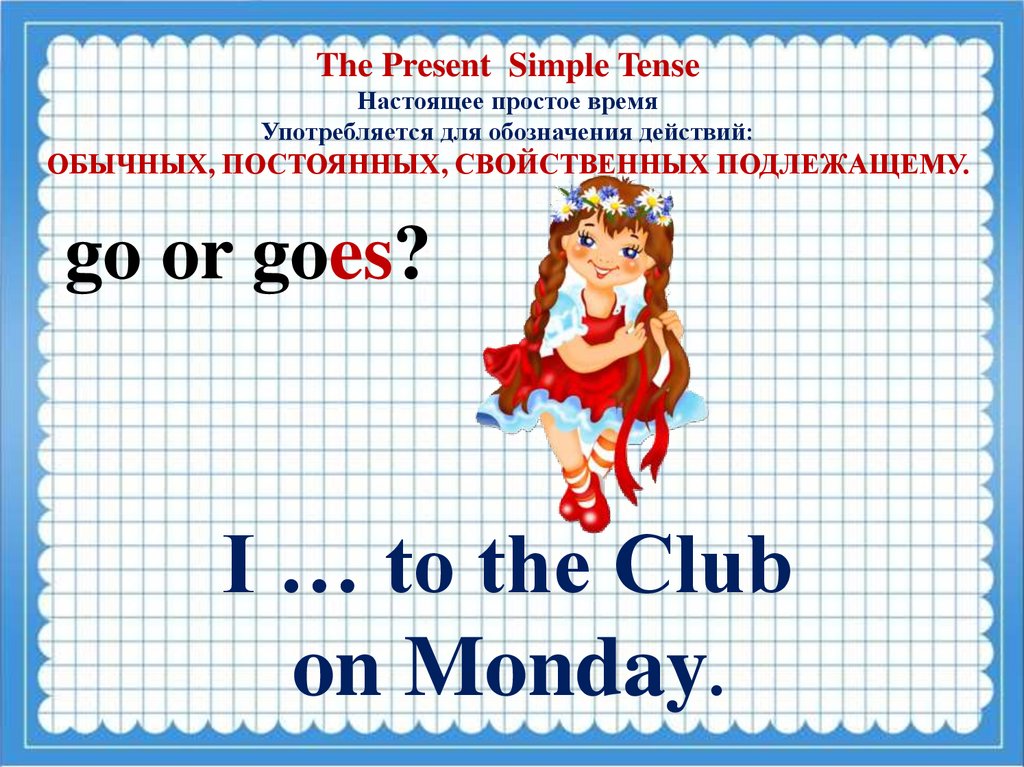



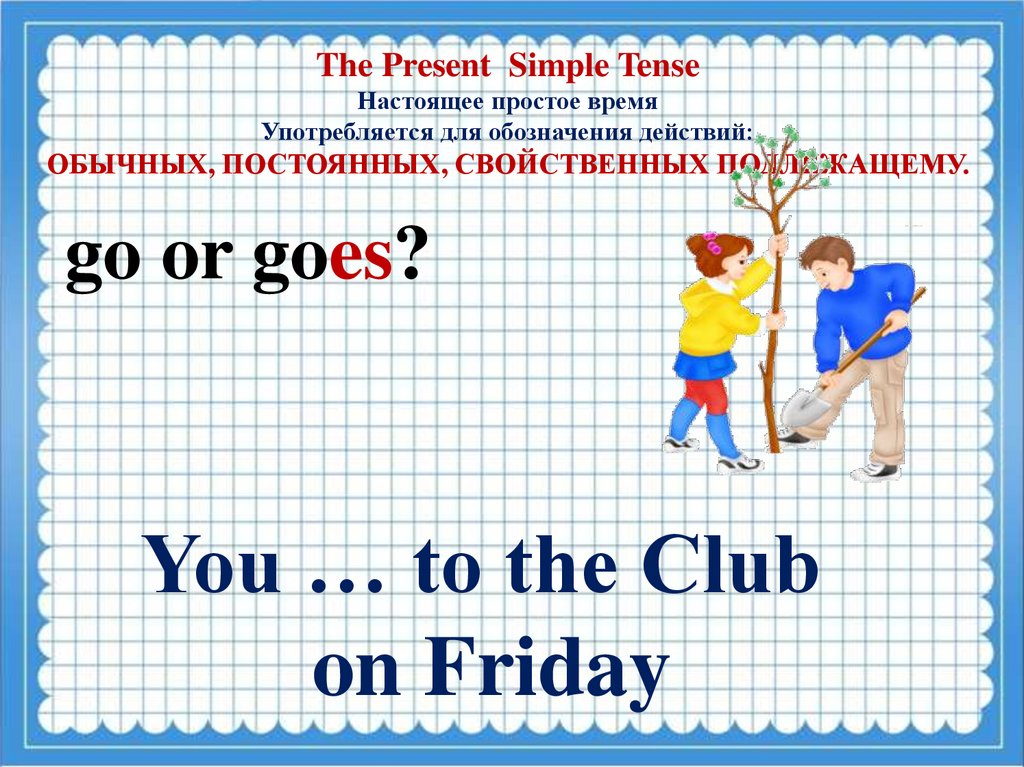
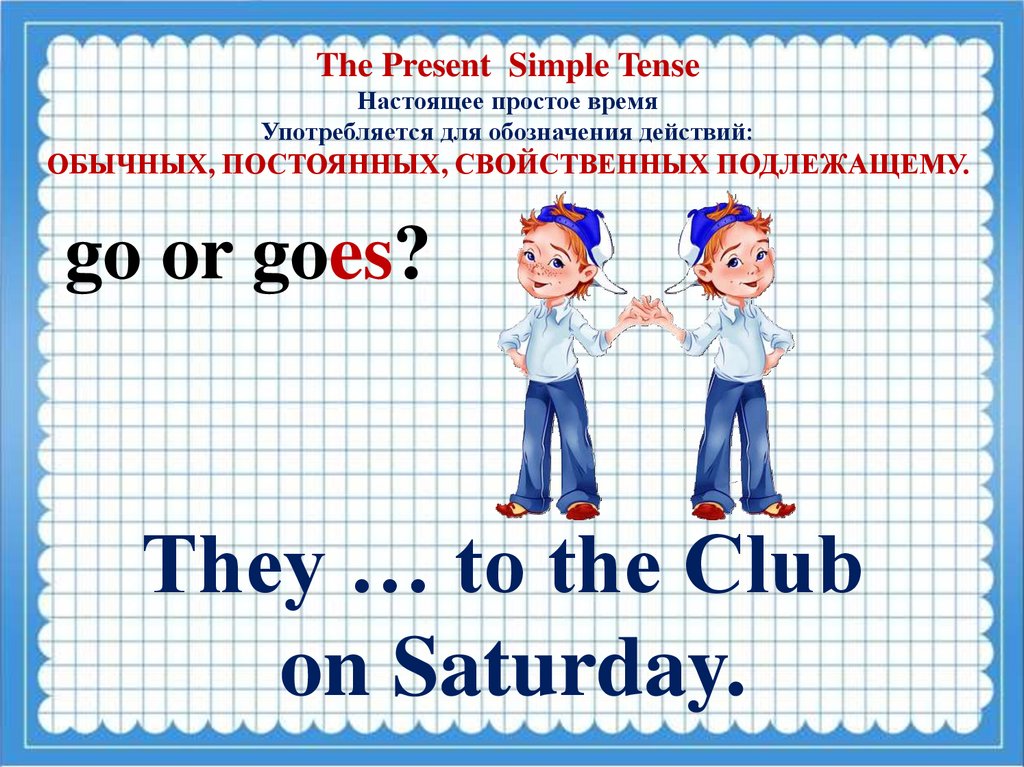



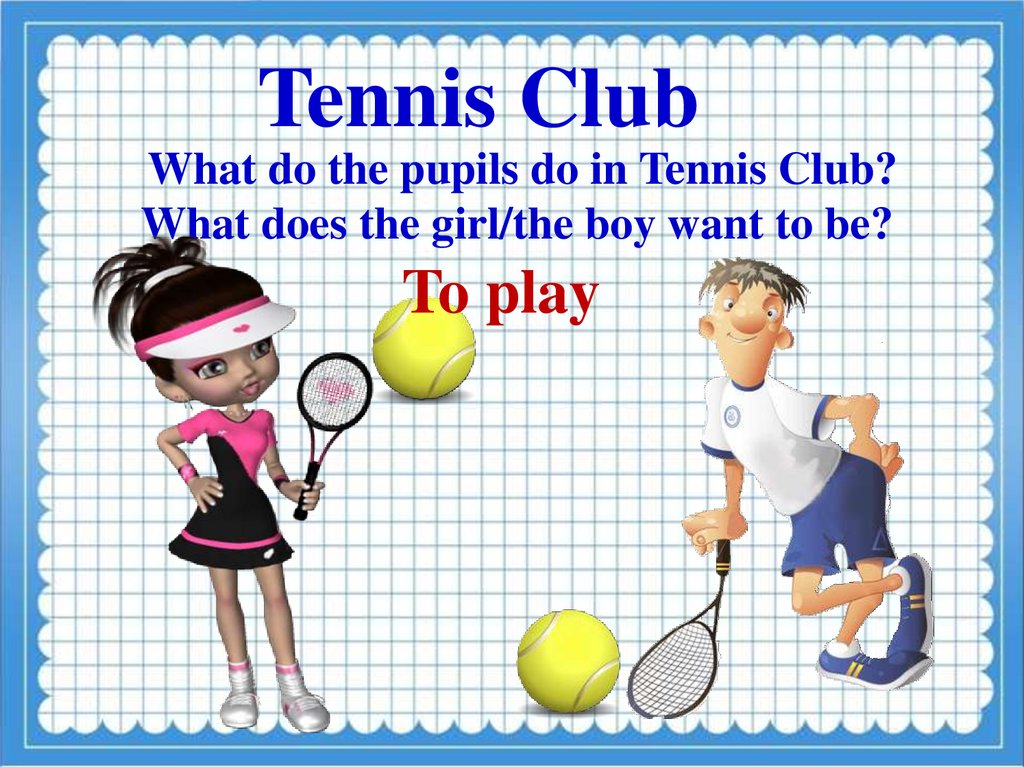
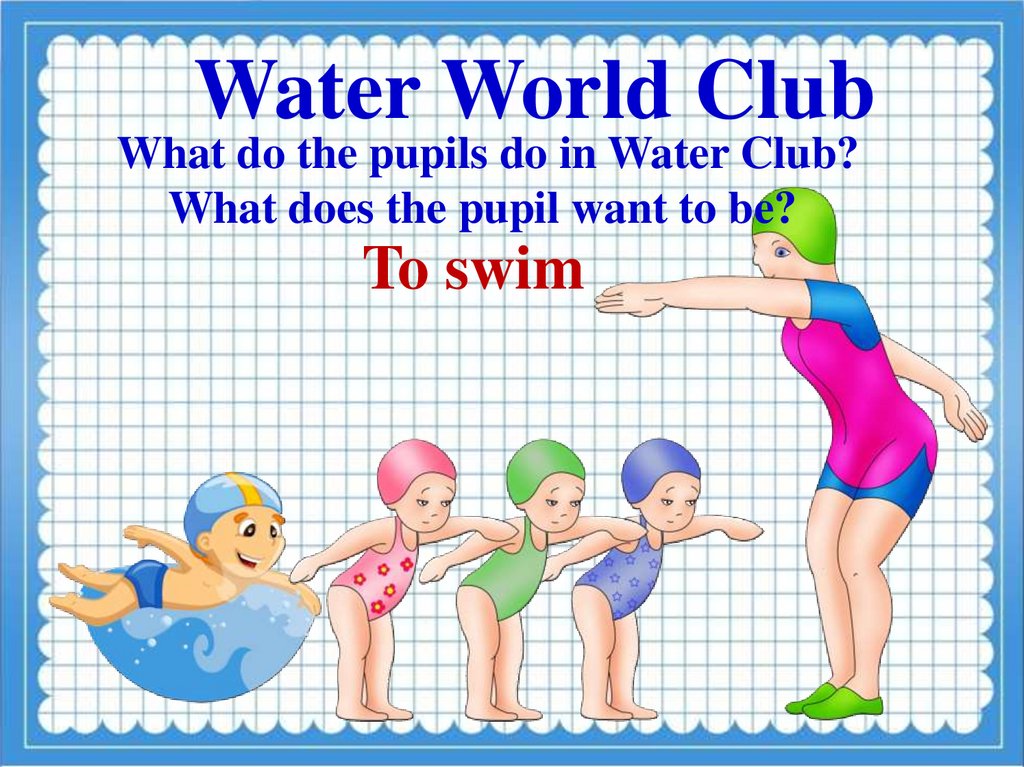



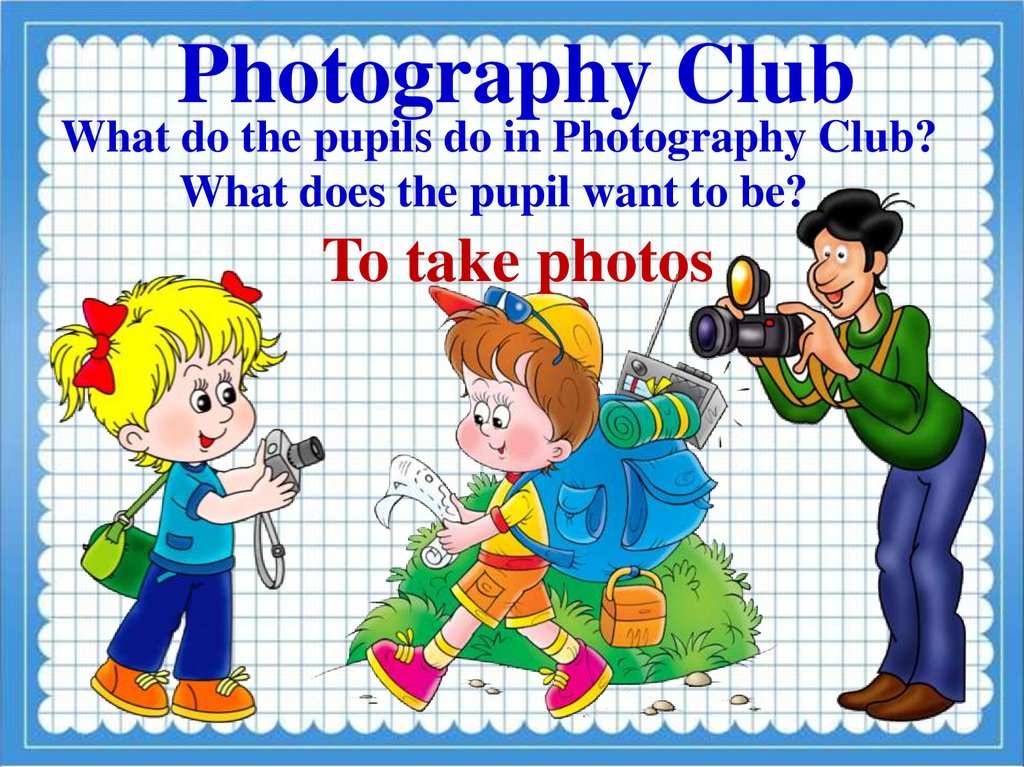






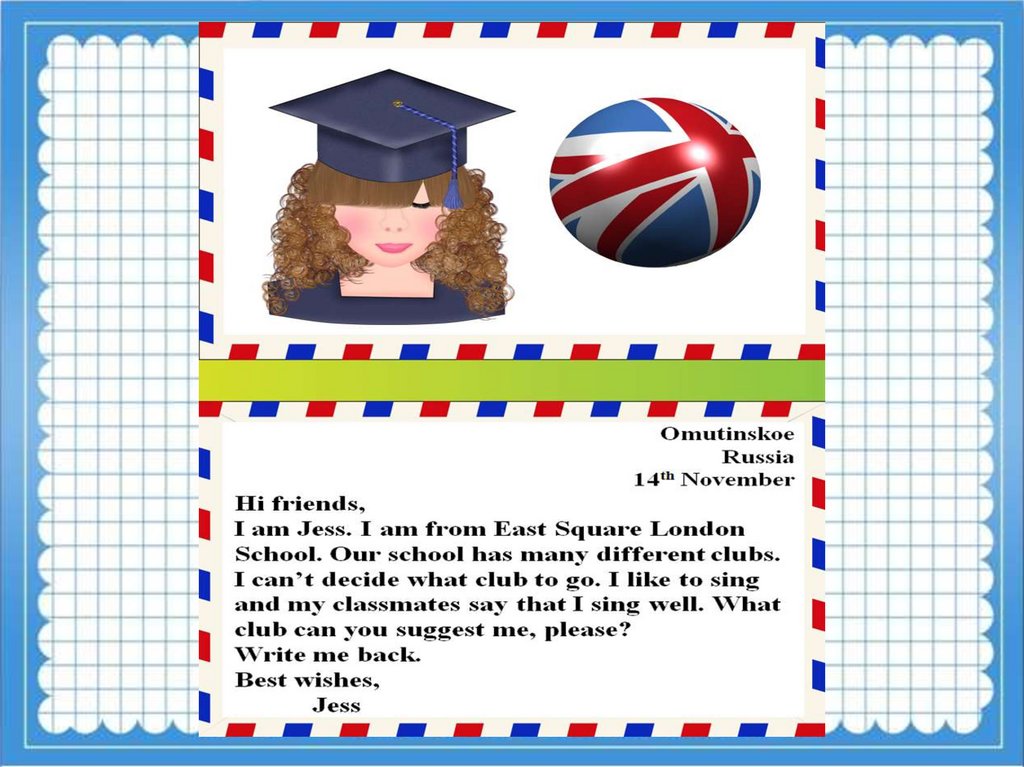

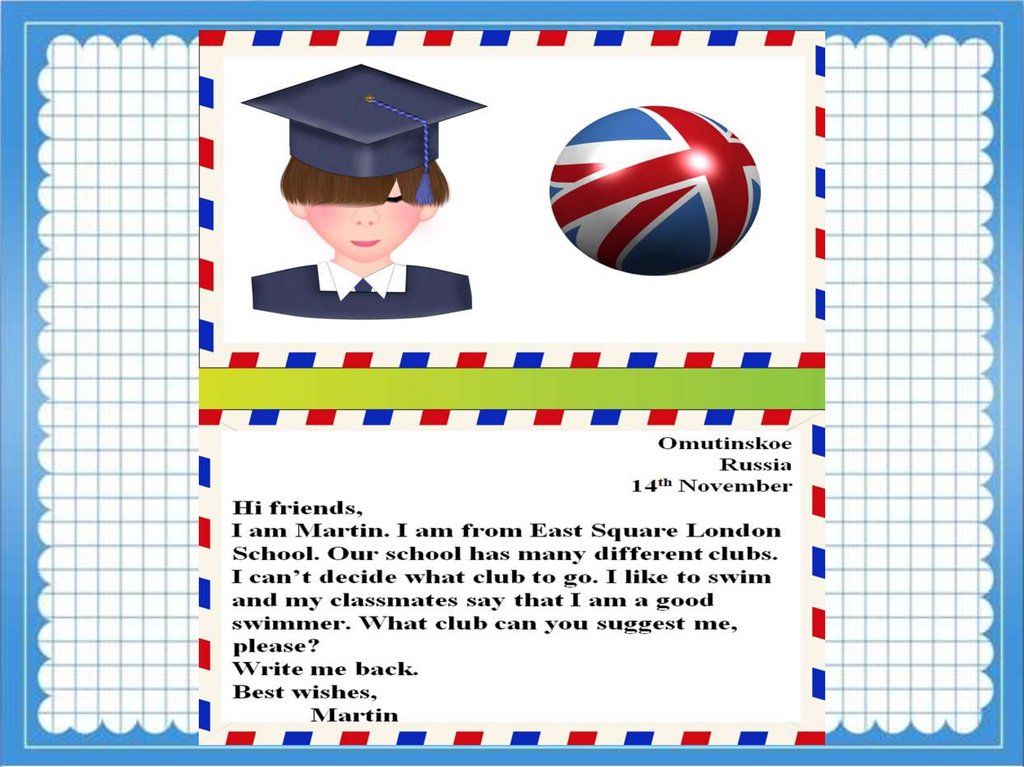





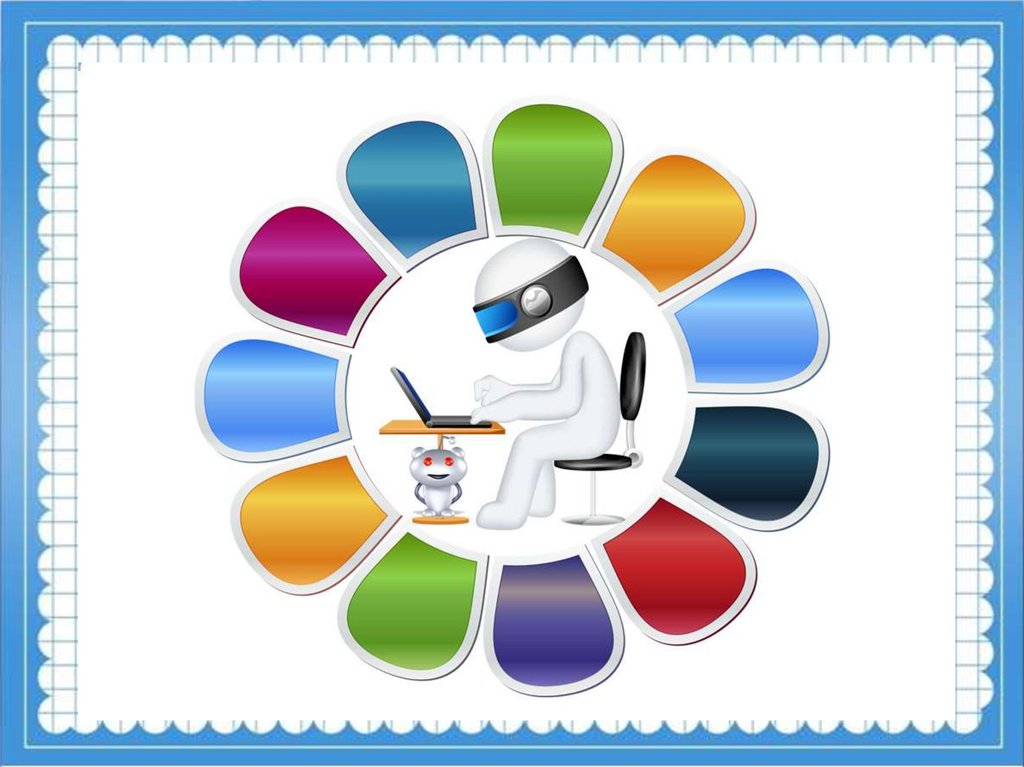
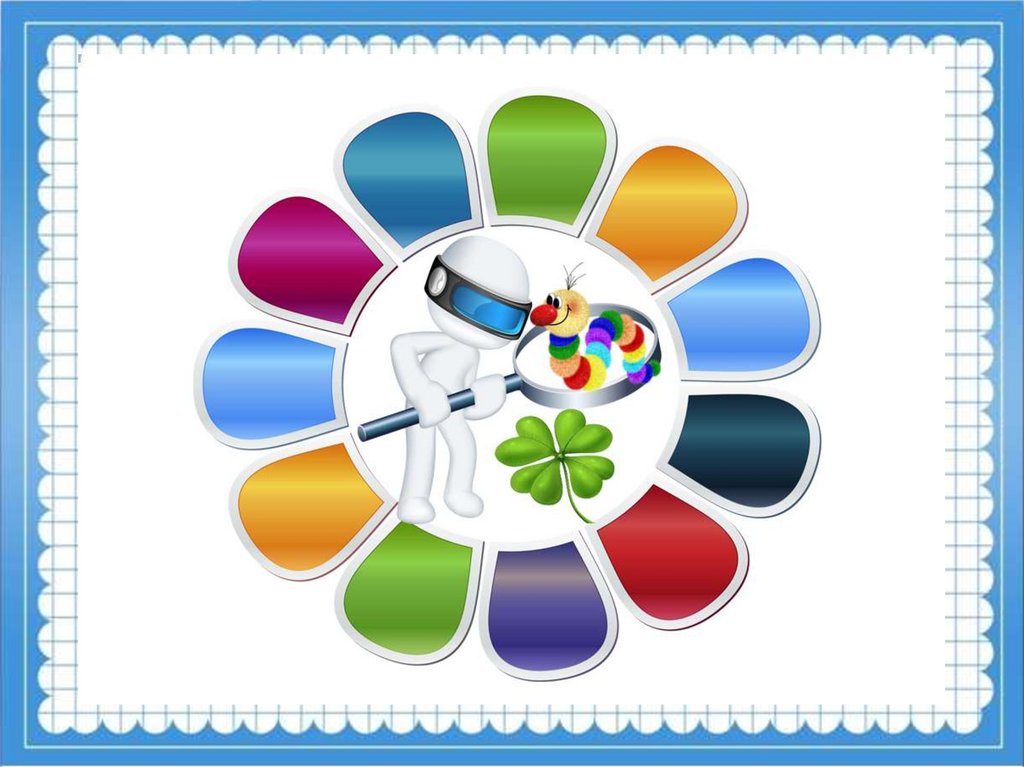





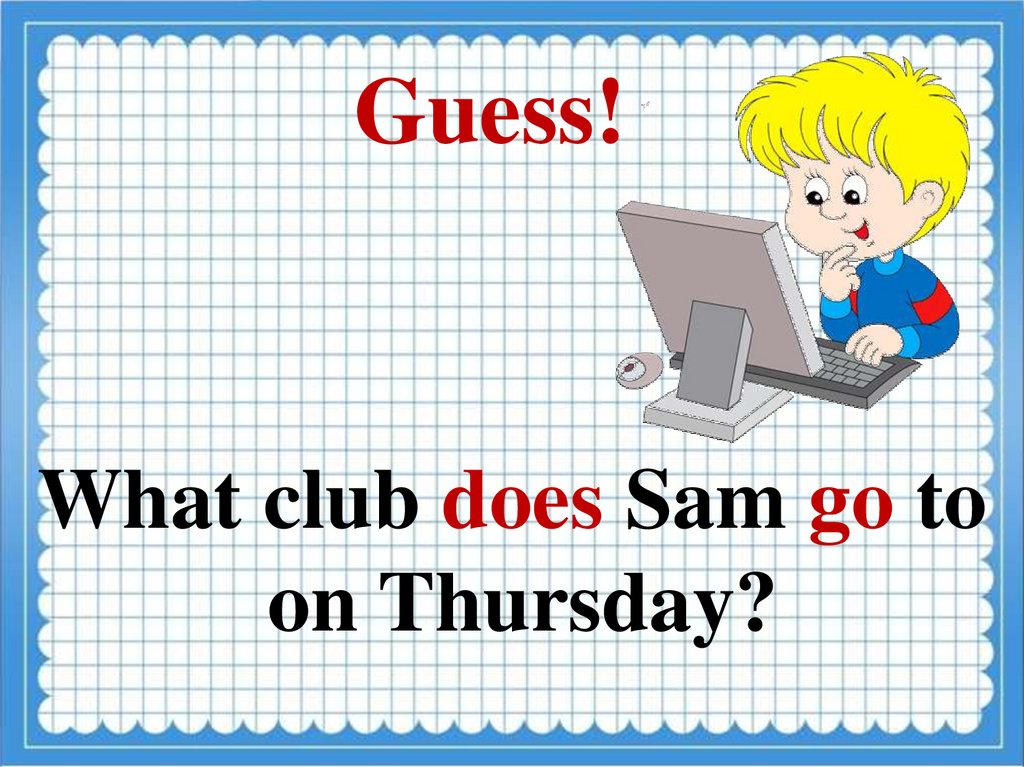
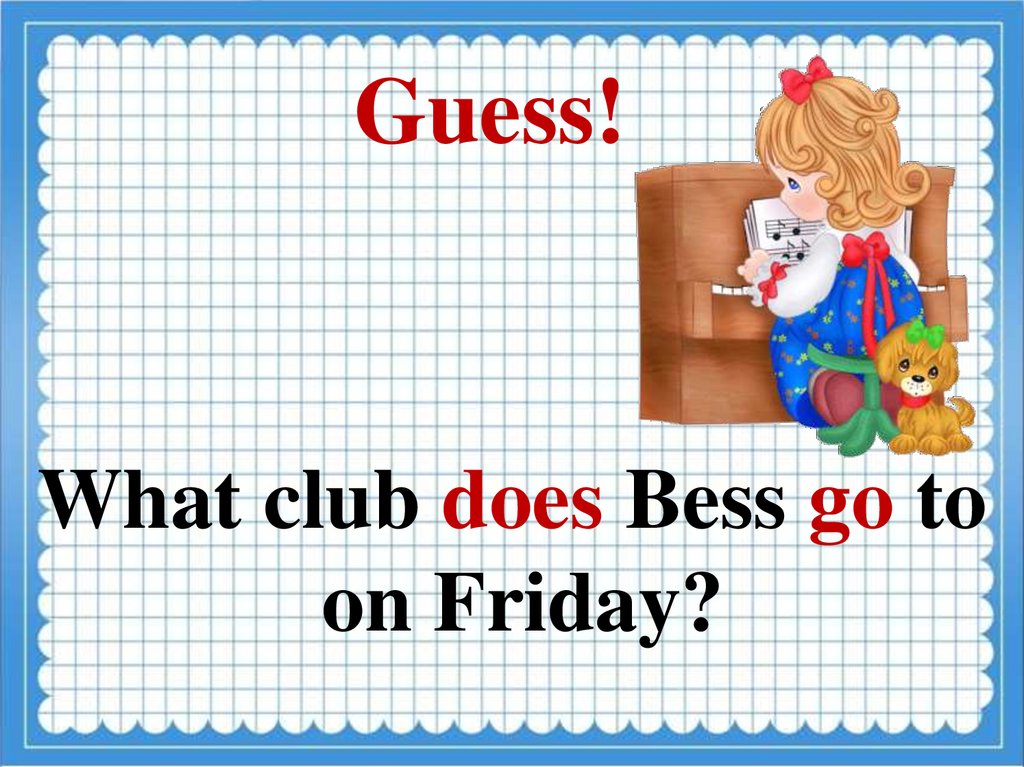




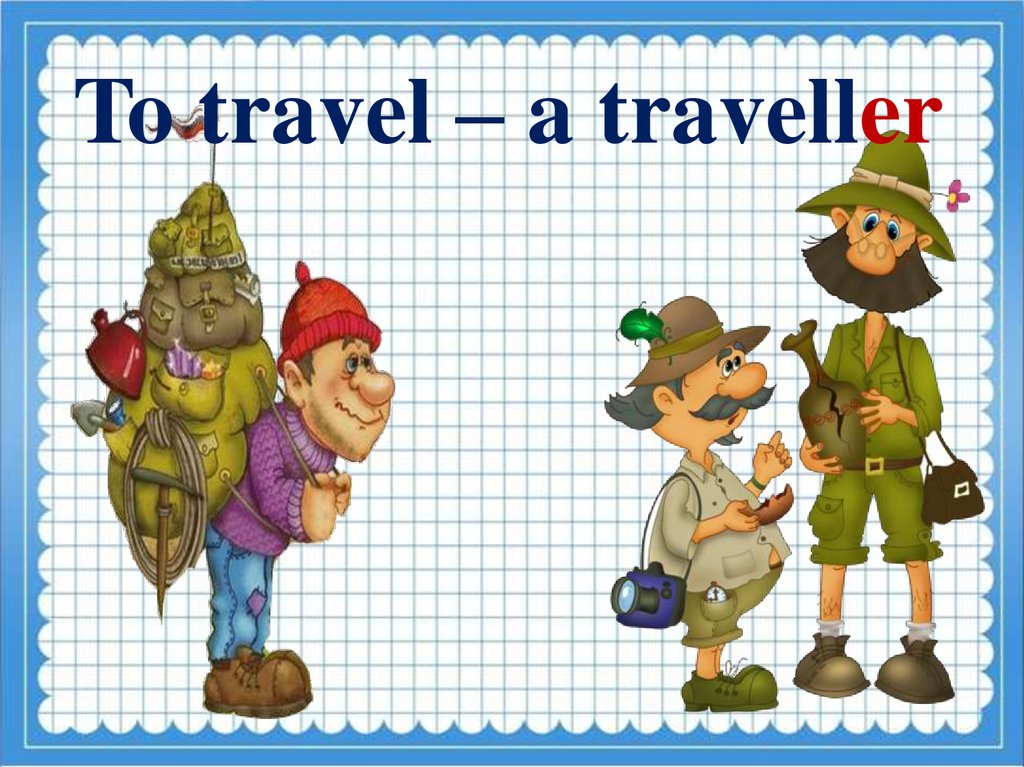
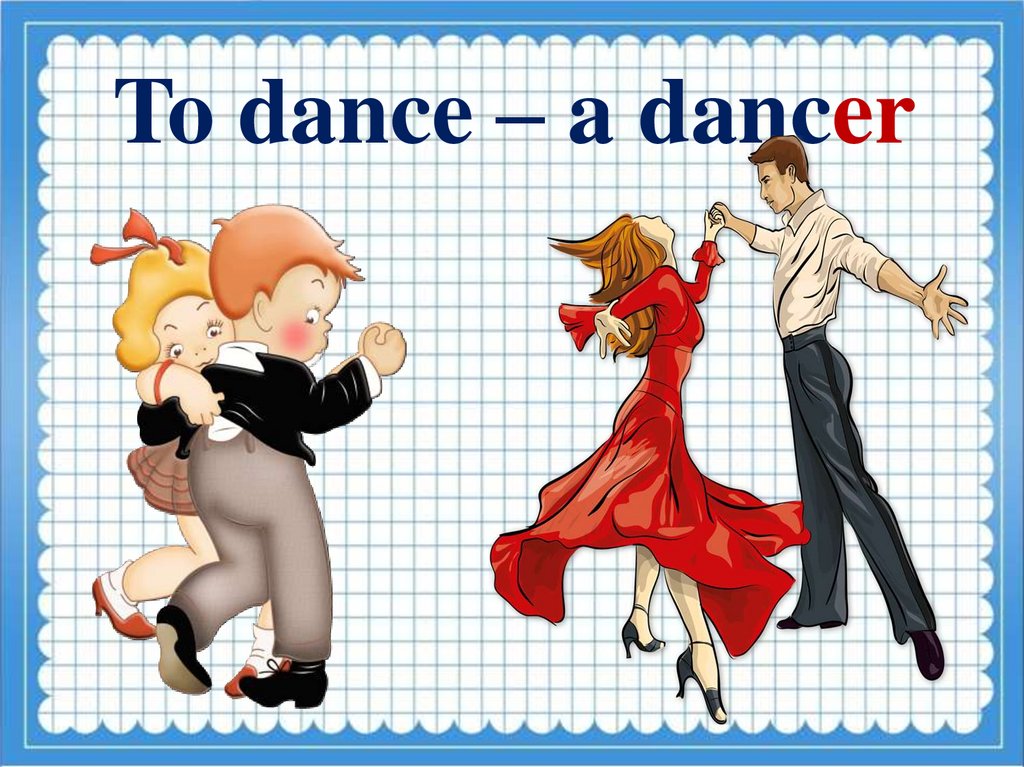




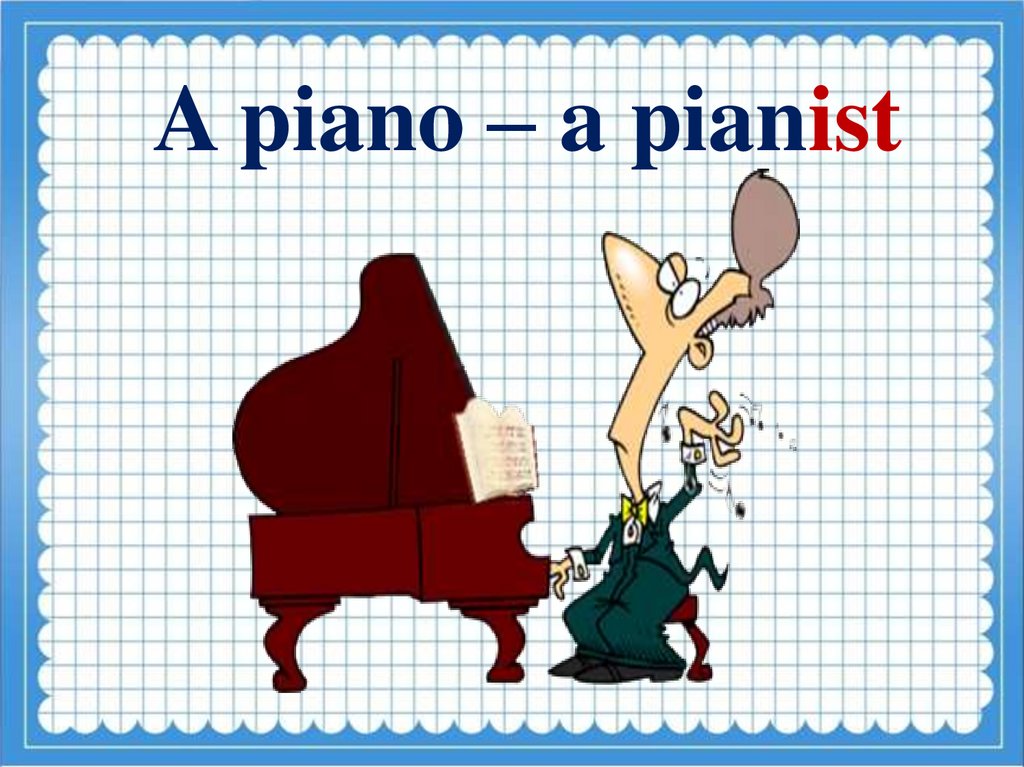
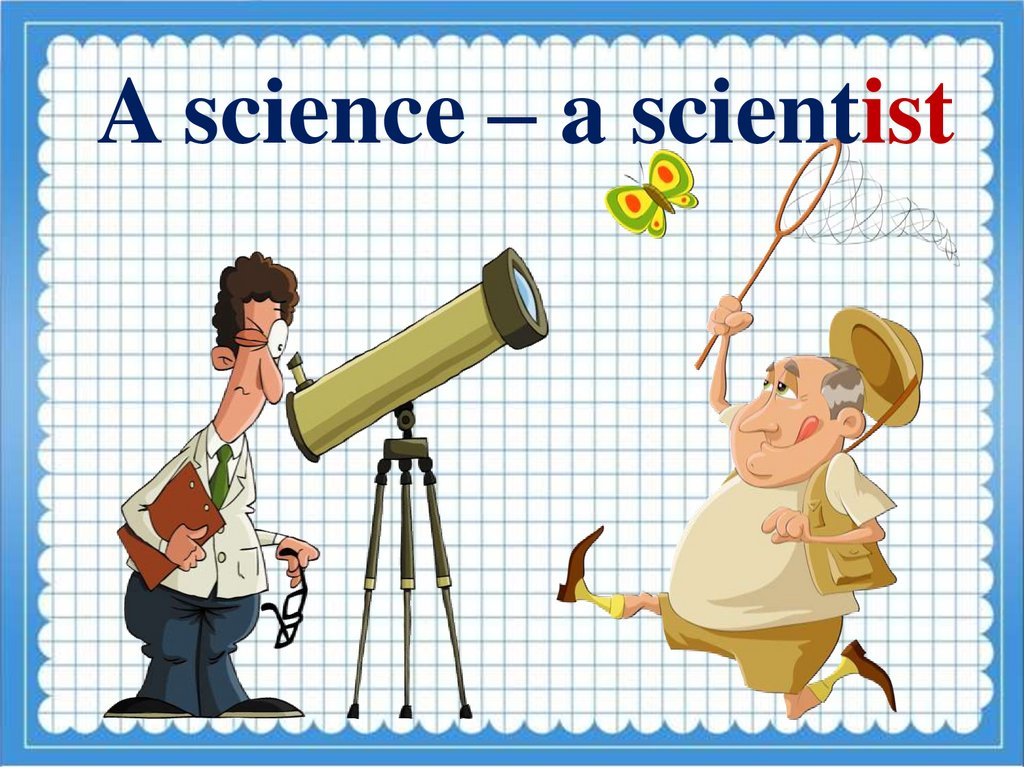
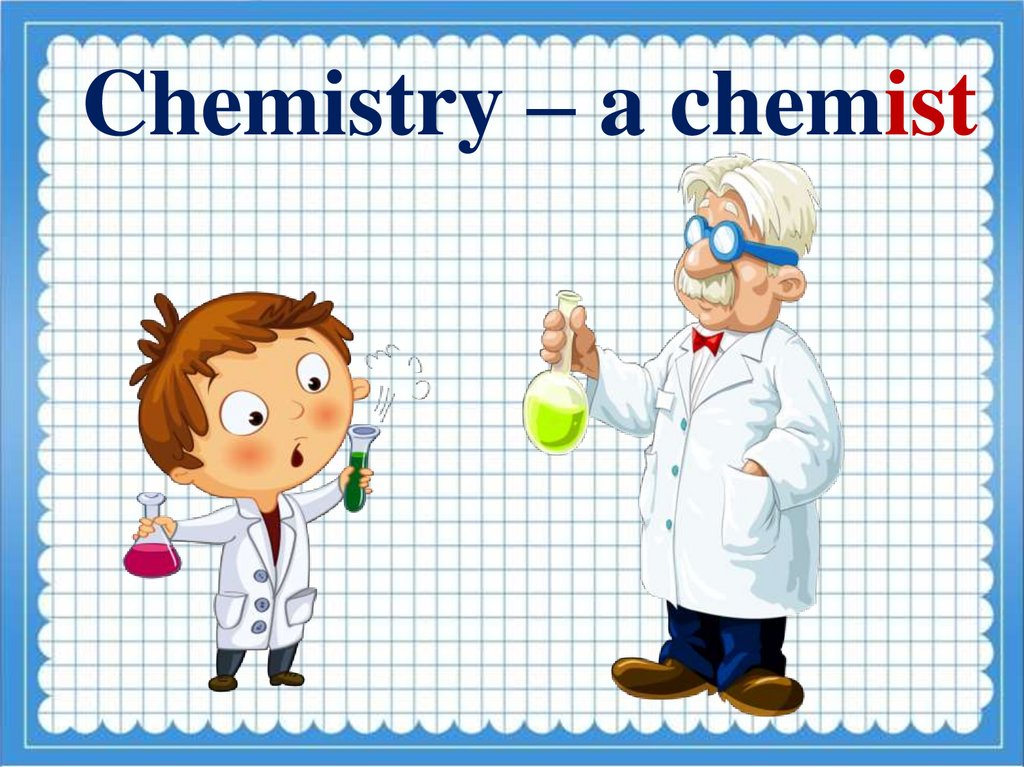
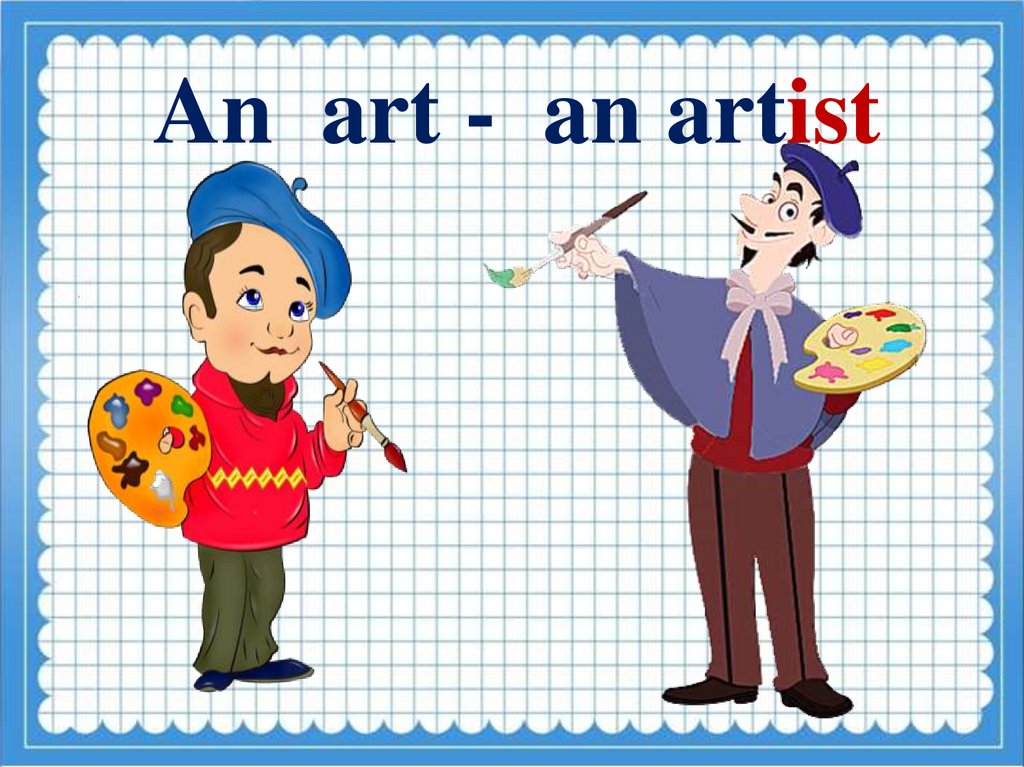
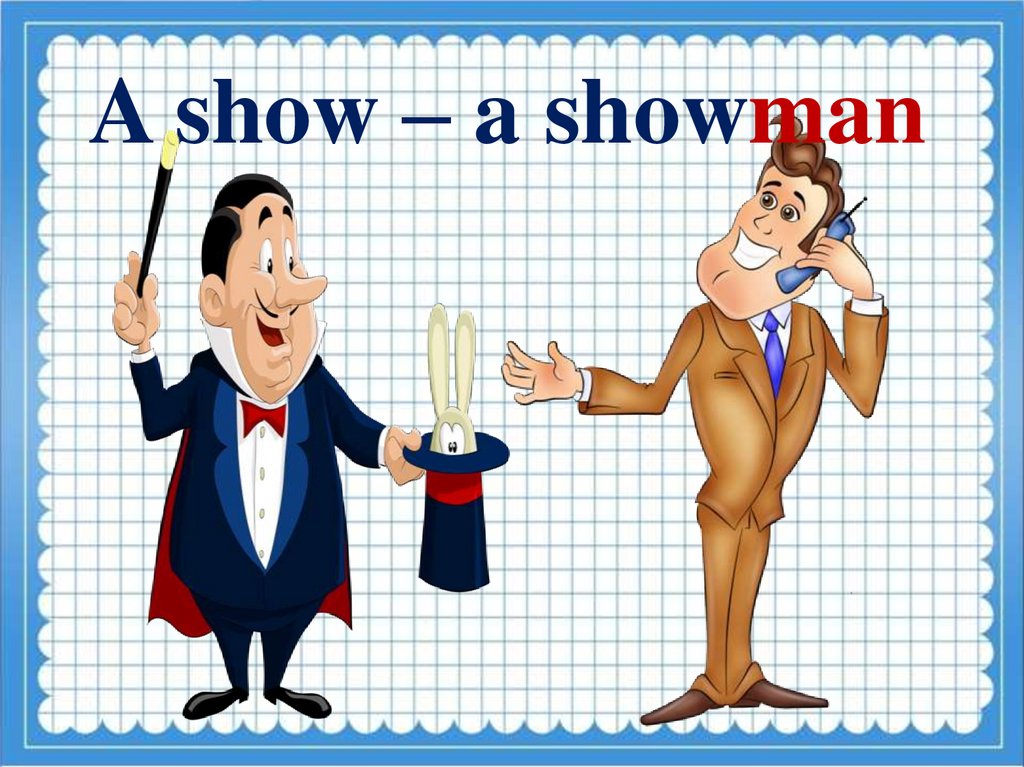

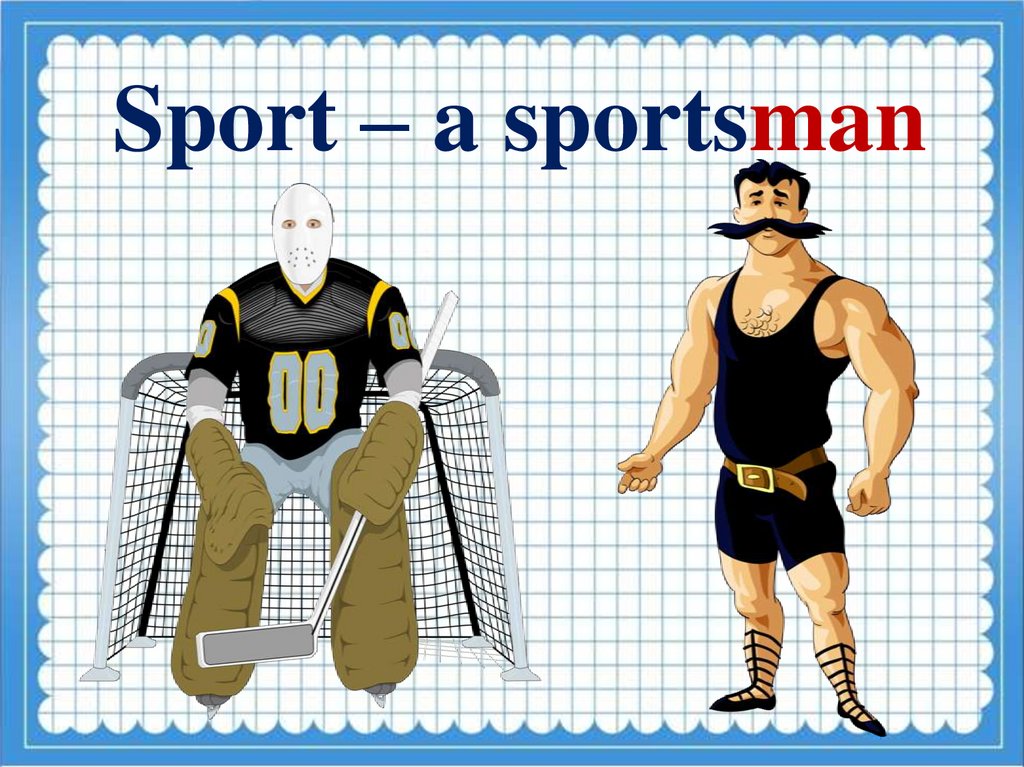





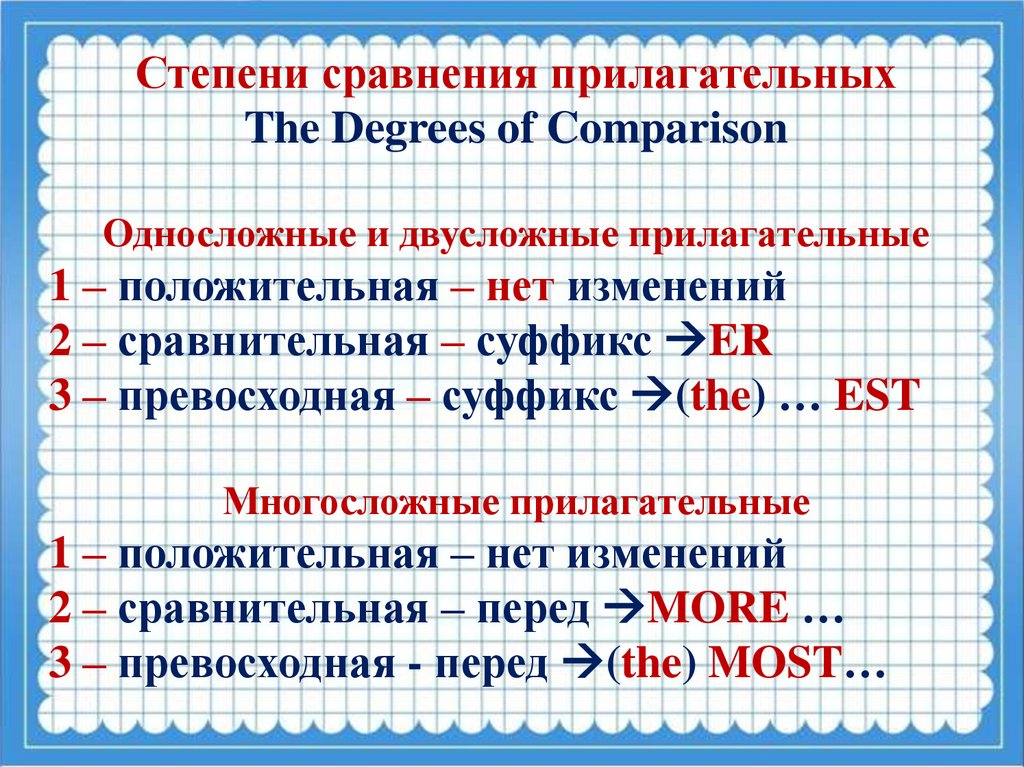

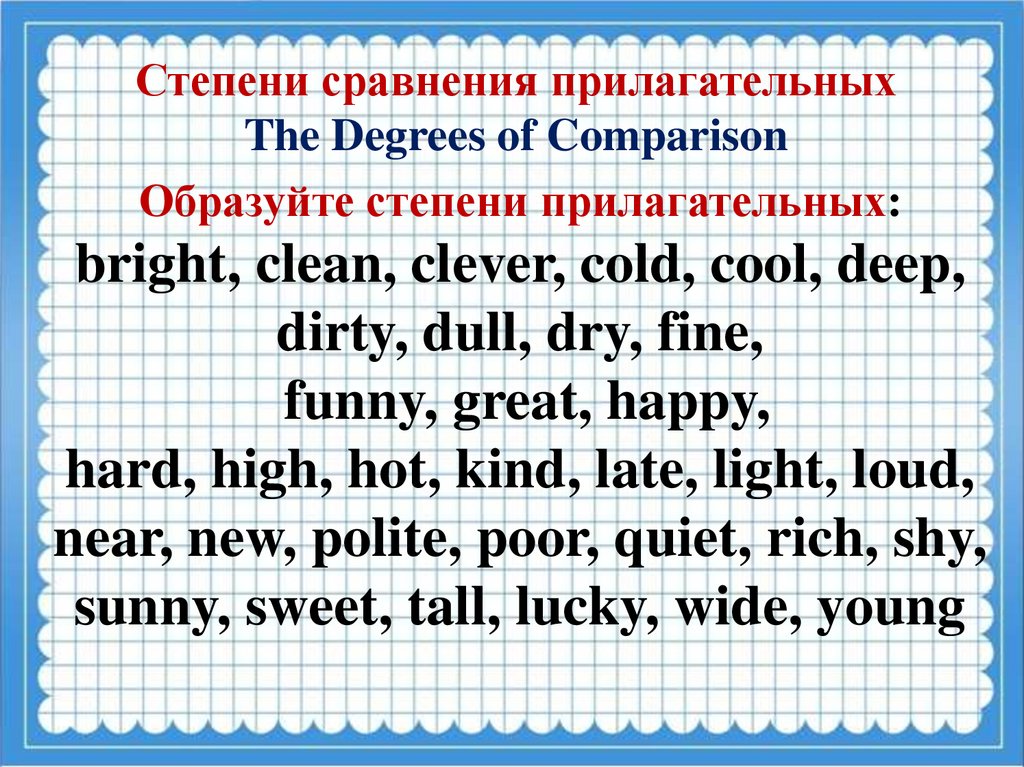

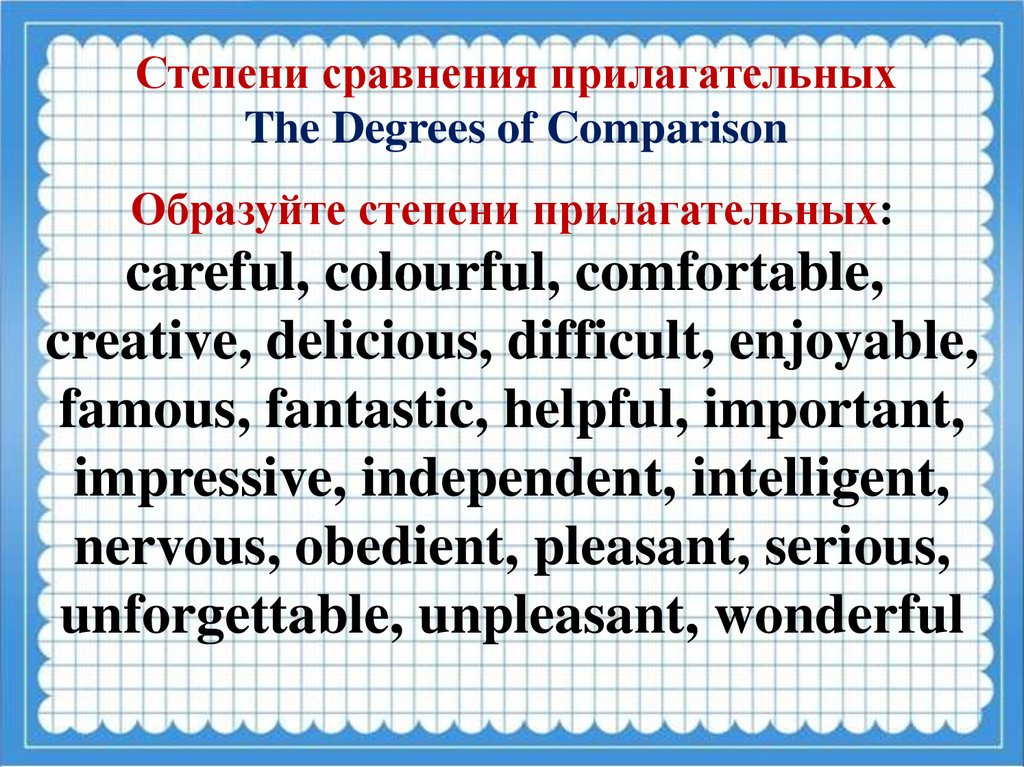
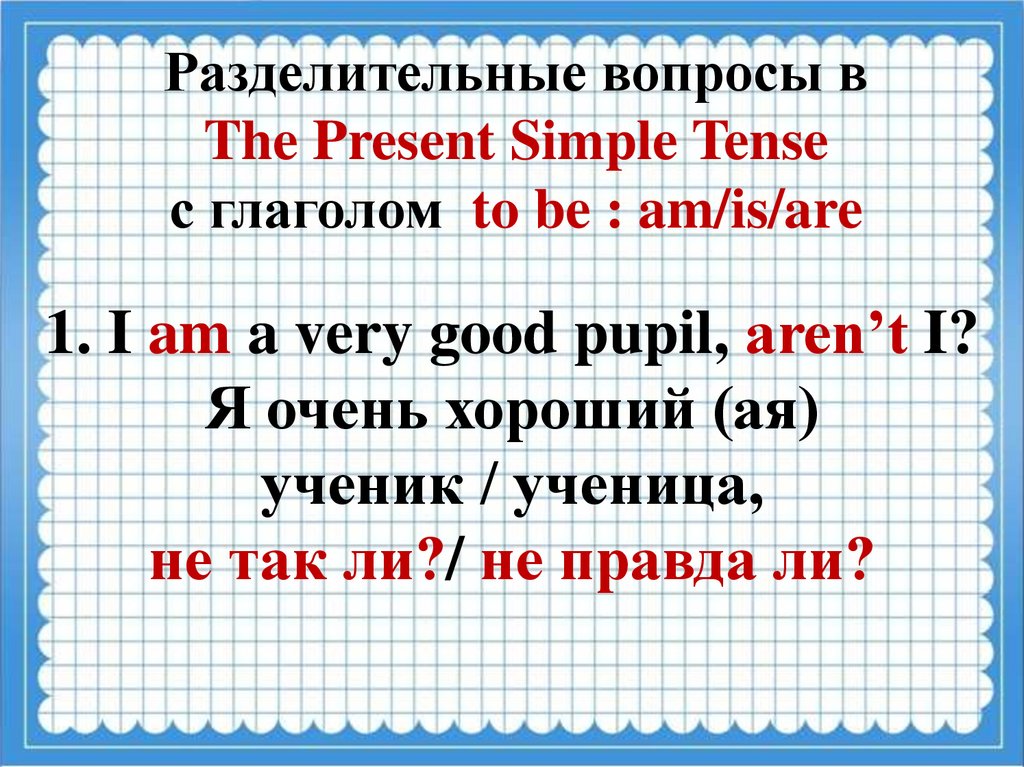

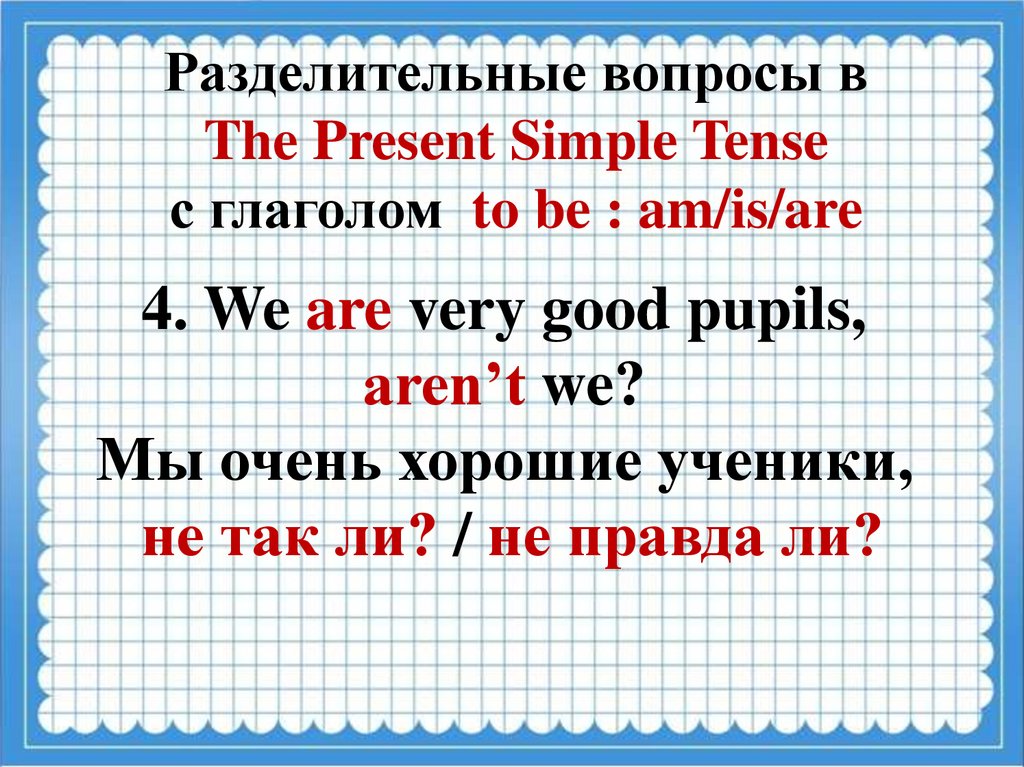

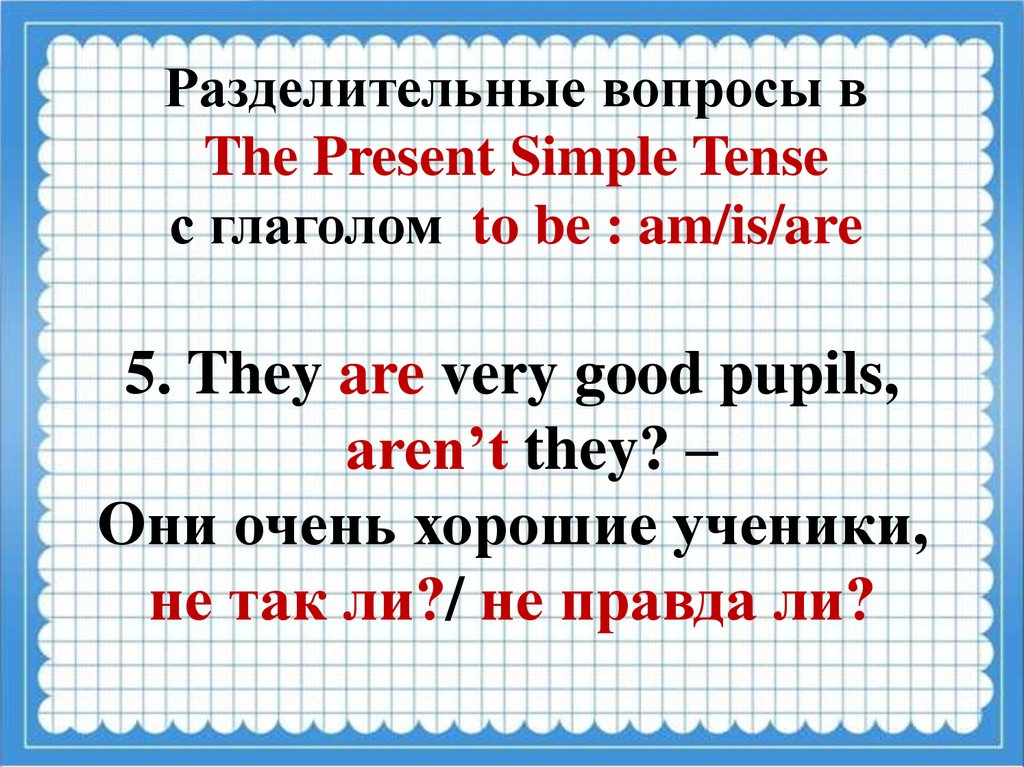


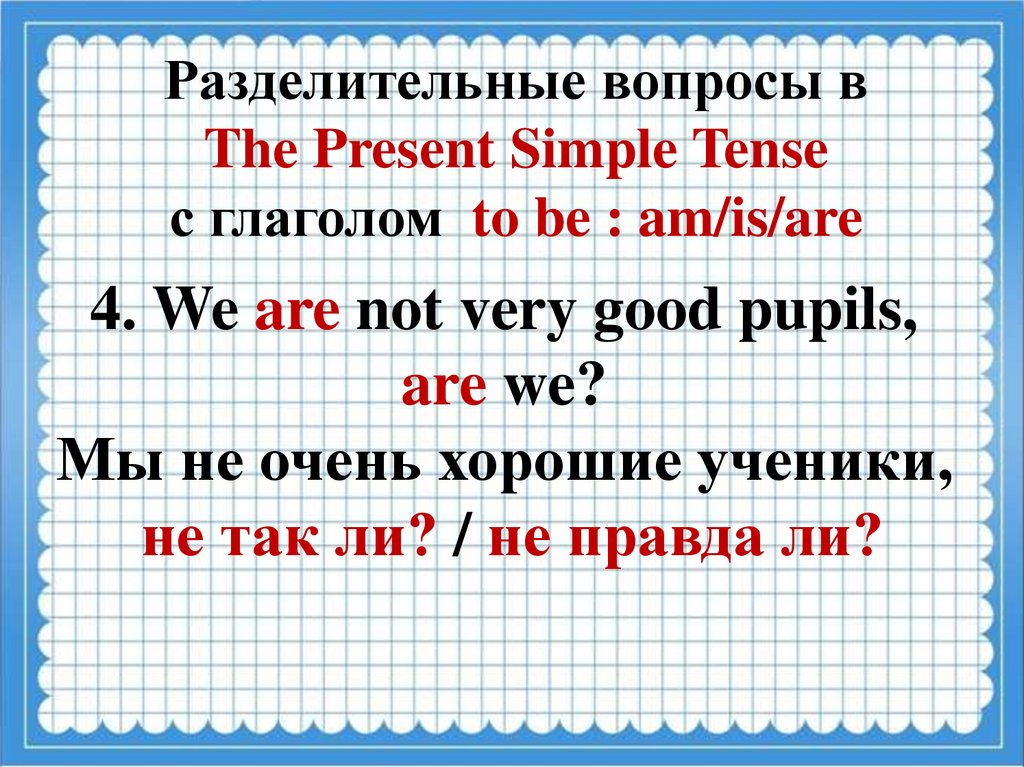

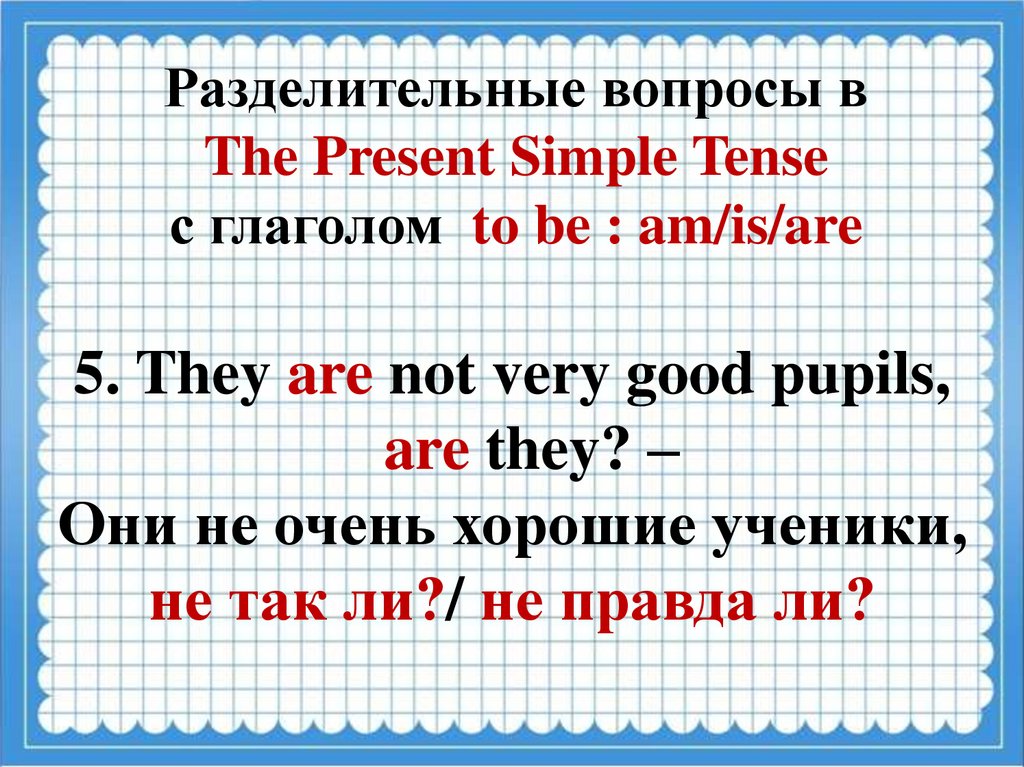

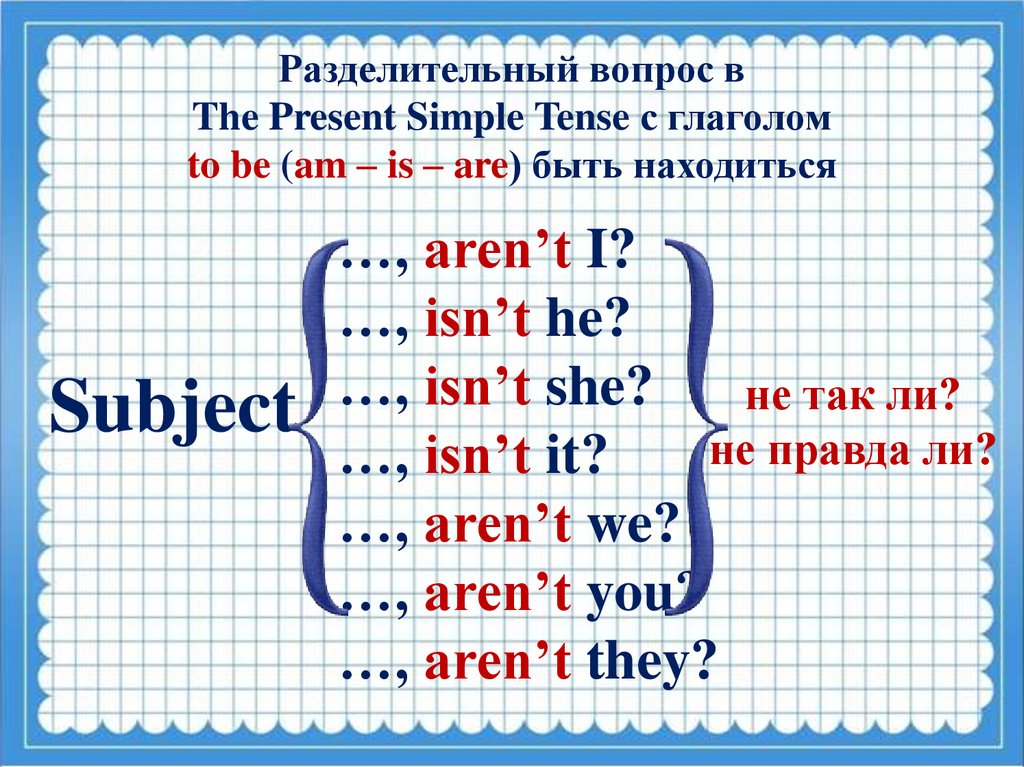
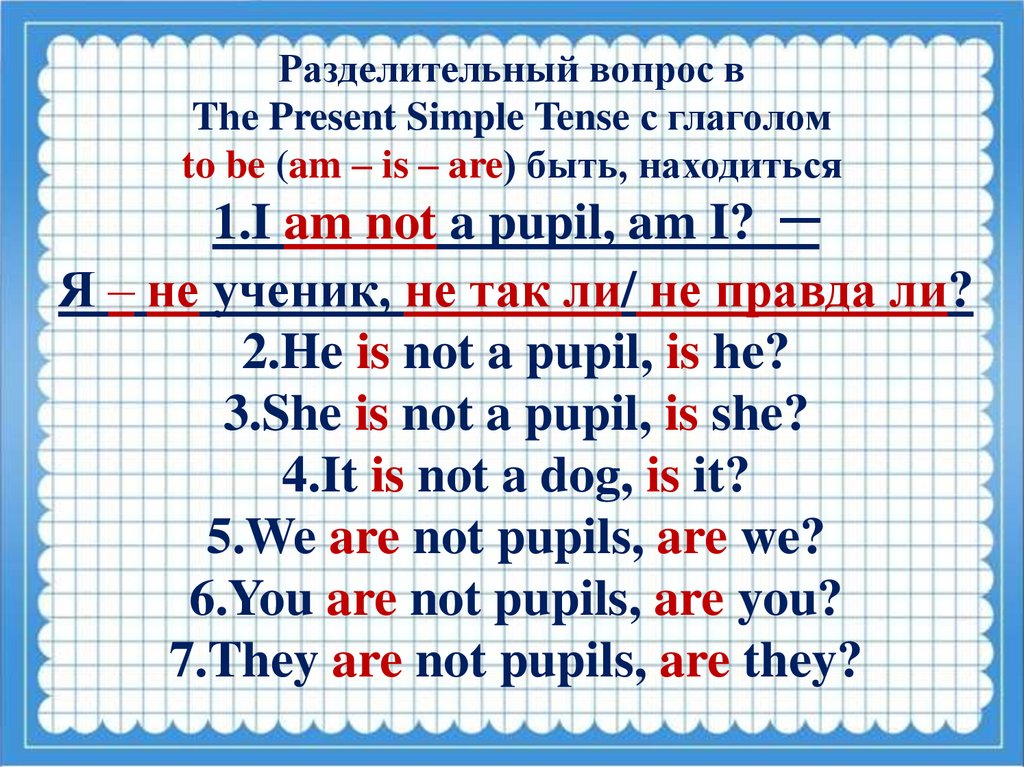


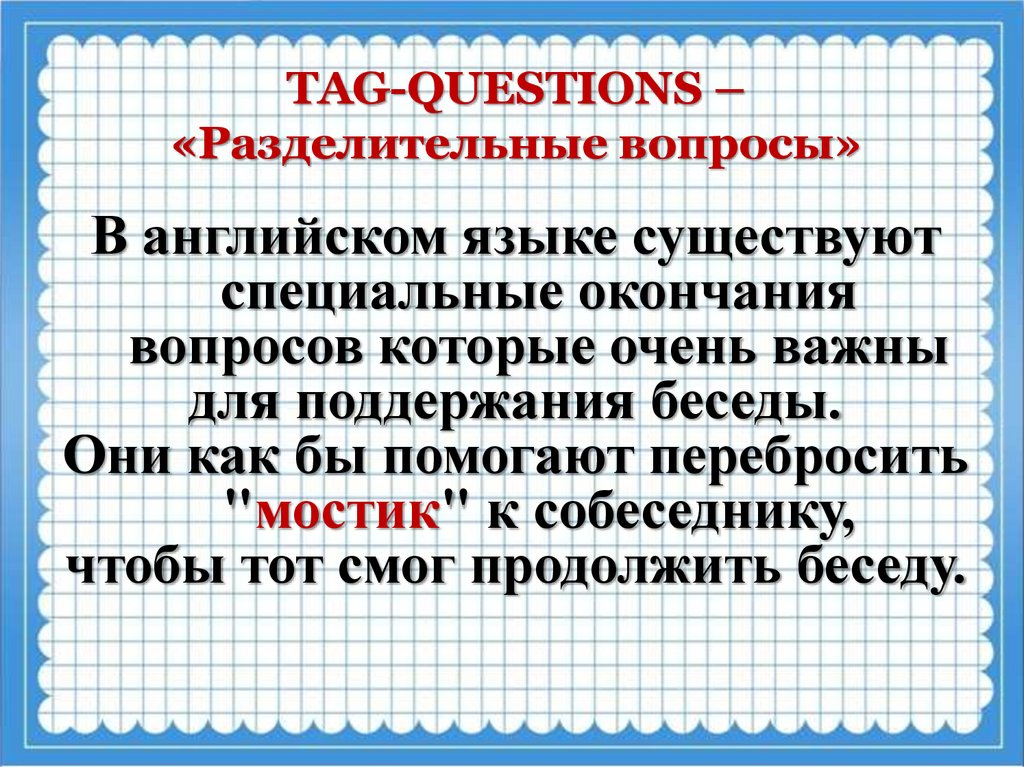
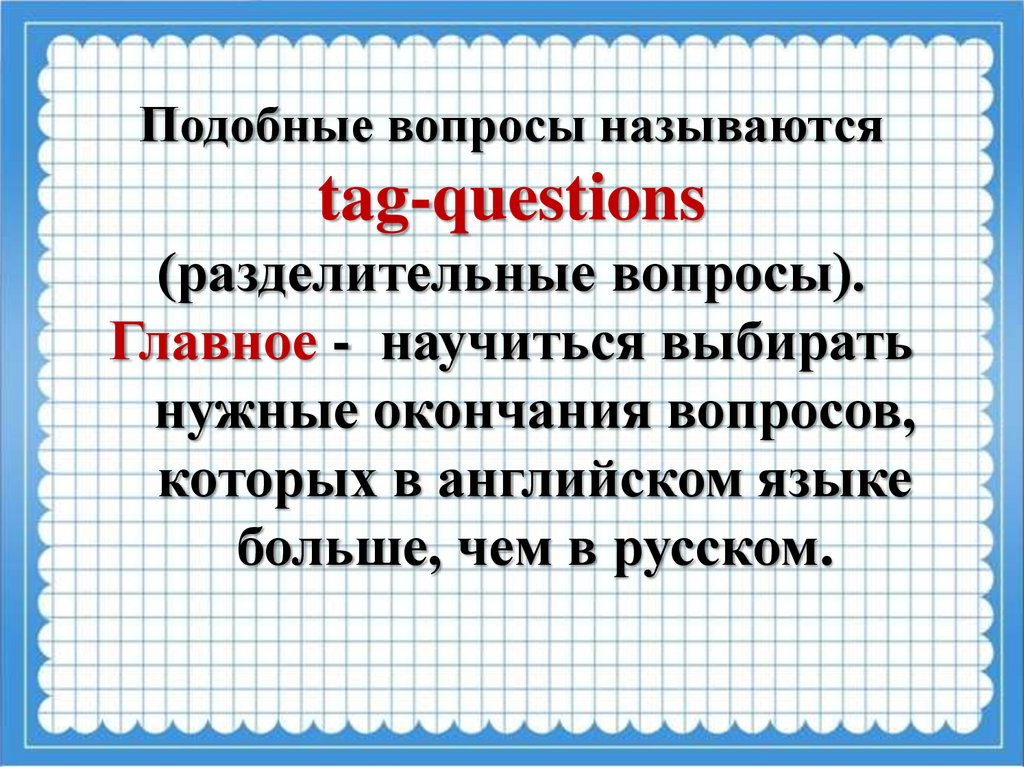

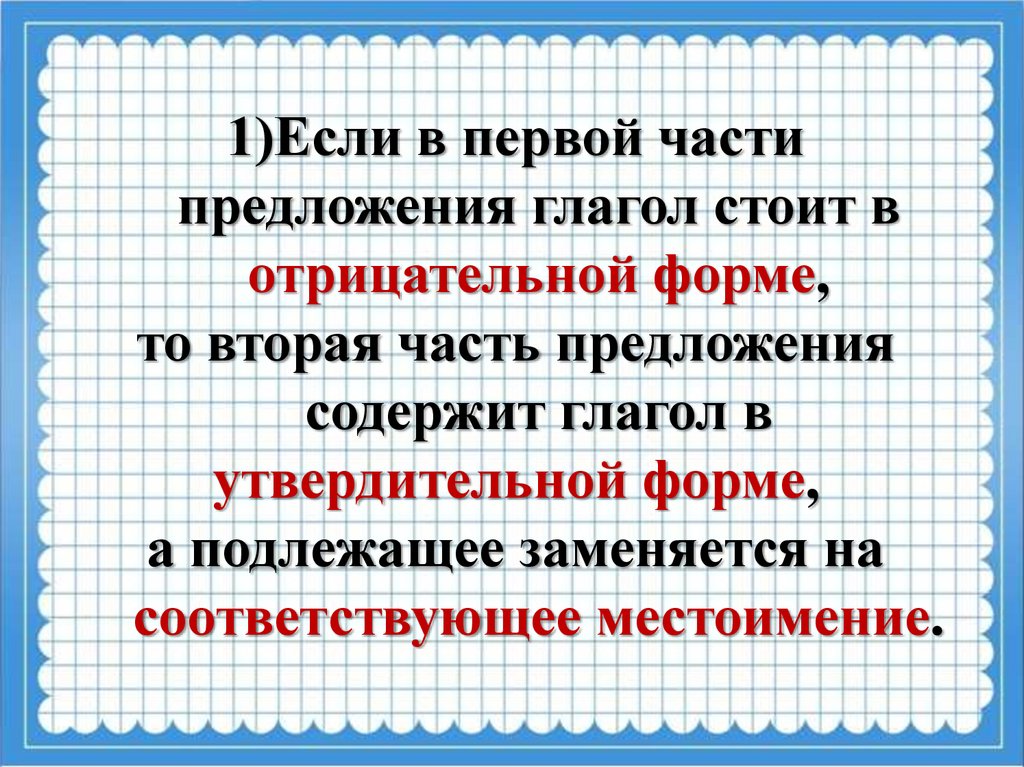

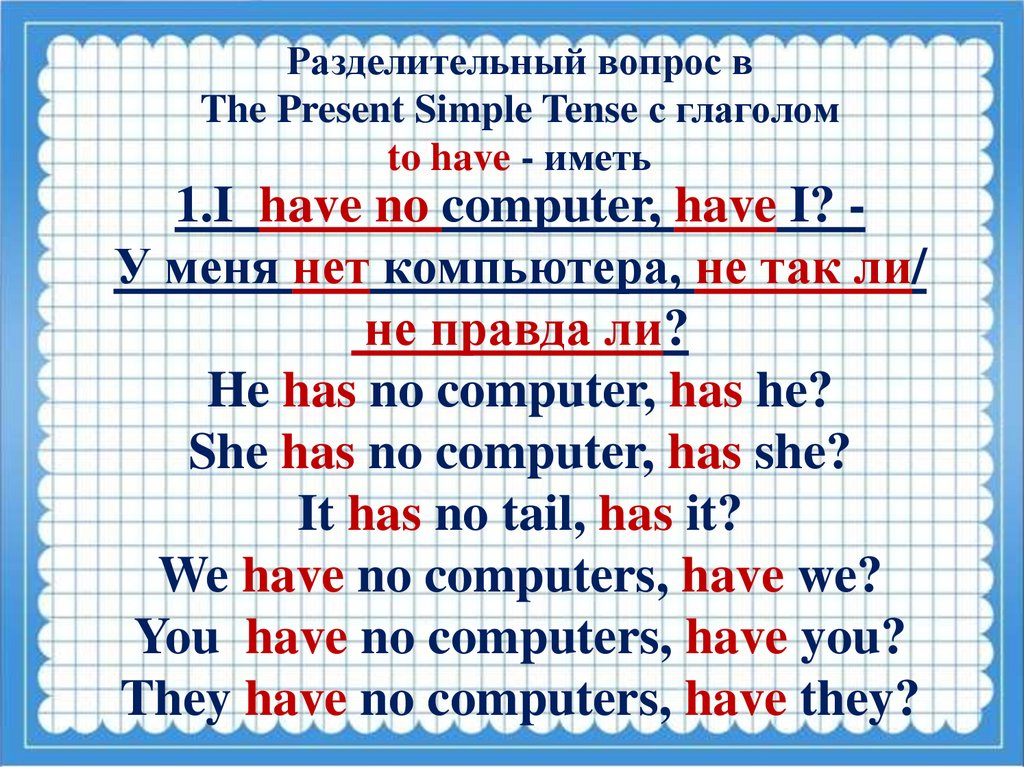

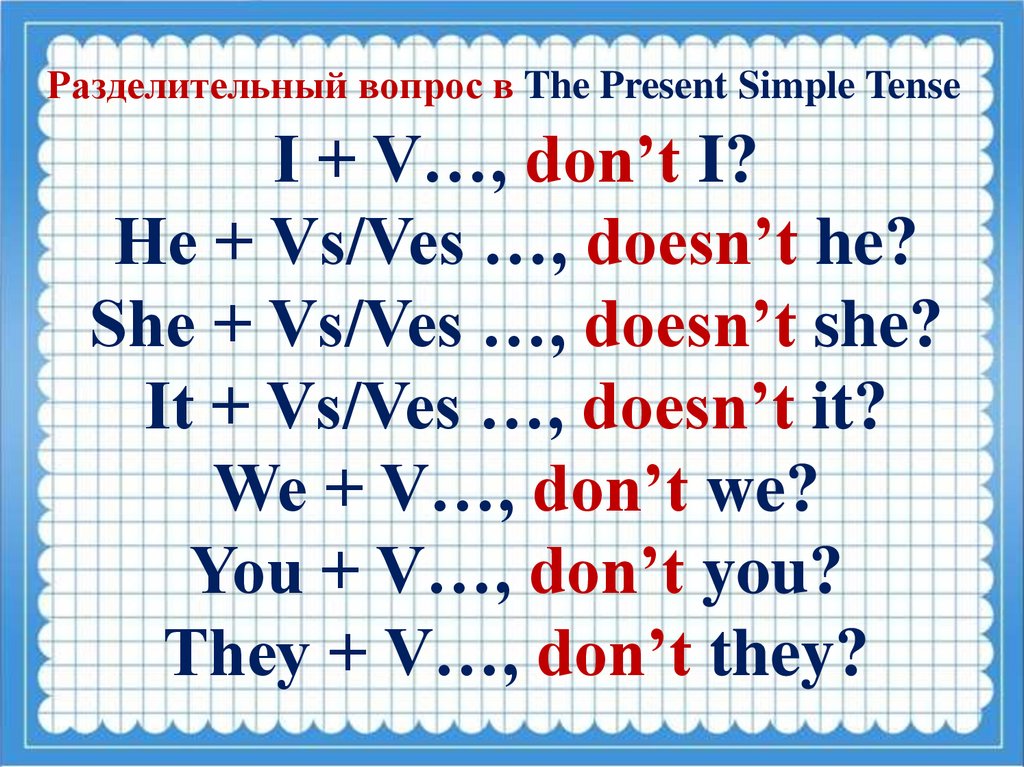










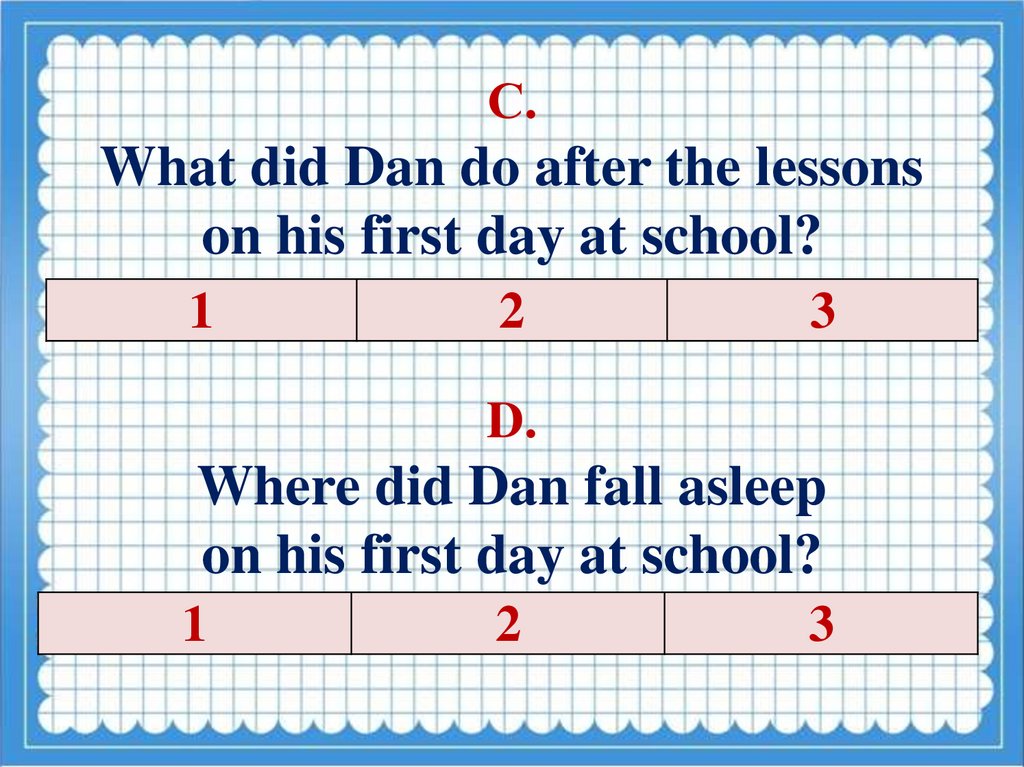
 Английский язык
Английский язык








